Tag: Ankur Counseling Center
Staff Spotlight: Chhori Laxmi Maharjan
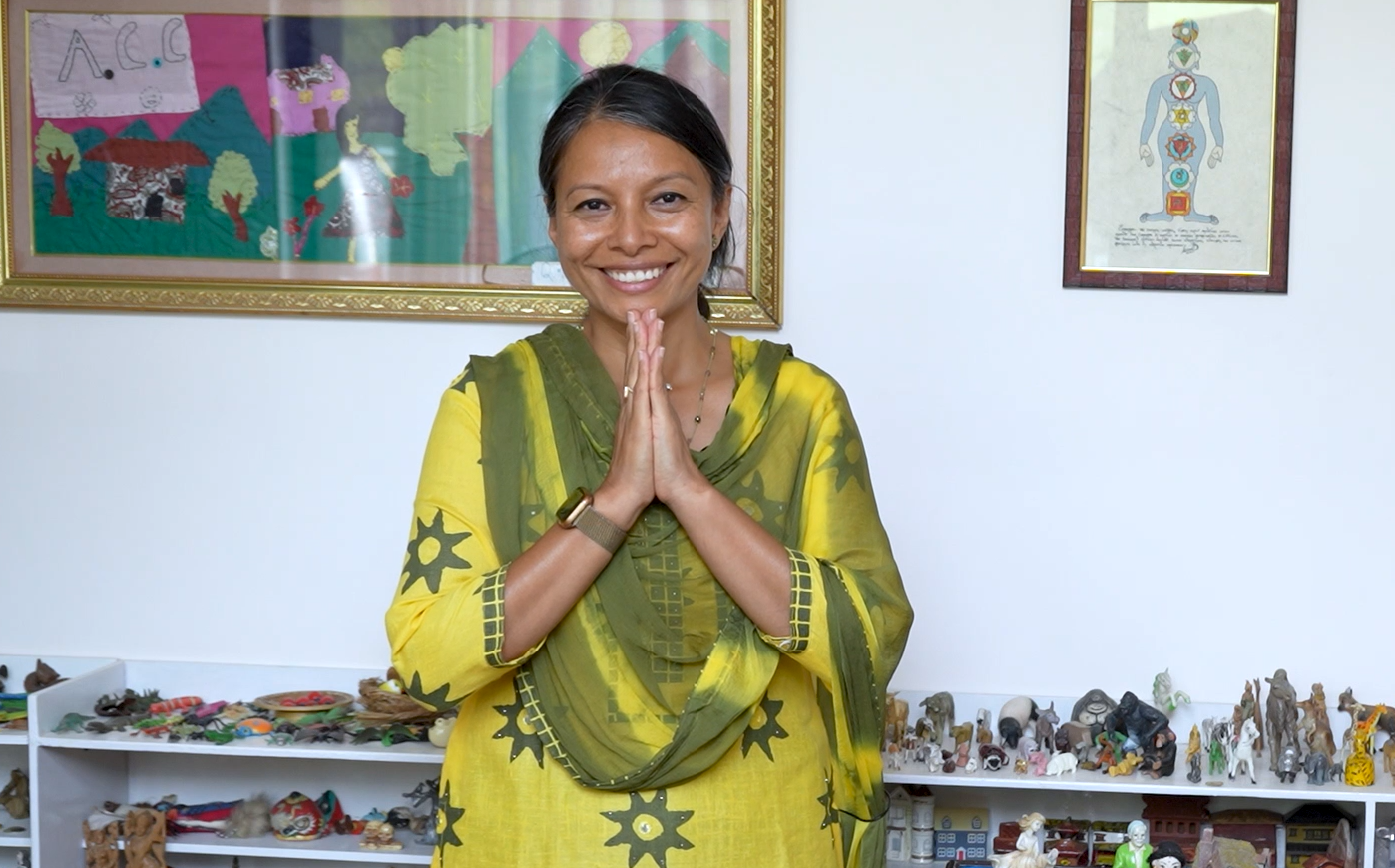
Chhori Laxmi Maharjan, Head of Ankur Counseling & Training Center
Dr. Chhori Laxmi Maharjan is the Head of NYF’s Ankur Counseling & Training Center. She cherishes daily opportunities to witness emotional healing in the children receiving therapy from her and her team.
“I get to know my client’s needs,” she says. “This is a chance to prepare them for any risks and achievements, as well as to help them address their most prominent issues, such as anxieties, worries, and hopelessness. I can be the safe container for them with a loving, compassionate heart.”
“Nisha”
One young patient, “Nisha*,” came to Chhori’s office when her guardians noticed she was struggling in school and finding it difficult to get along in social settings. Nisha described intense feelings of inner conflict, trust issues, loneliness, and poor self-esteem. As Chhori listened, however, it became clear that Nisha’s personality was joyful, hopeful, and creative. But traumatic experiences in her early life had made Nisha very guarded and distrustful of these traits.
“She mentioned her dream to become a successful person in the future,” Chhori remembers. This dream became a guiding light in Nisha’s healing journey.
Meeting once a week, Chhori and Nisha began coaxing her natural positivity out of hiding. They used a child-centered technique called sandplay therapy.
In the beginning, Nisha’s work revealed themes of deep hopelessness, with only small sparks of joy and playfulness emerging. But as she grew more comfortable, and in coordination with her guardians and teachers, she became kinder and more compassionate towards herself. Her perspective on herself began to shift, and she realized that she possessed the power to change. Gradually, Nisha became more hopeful about the future. She choose to invest more effort in her schoolwork and to open her heart to friends, family, and classmates.
Today, Nisha is still working with Chhori in therapy. But she is doing so with a solid foundation of her own self-worth and making tremendous progress. Chhori feels deeply grateful for the opportunity to help each of her patients explore and overcome the challenges standing between themselves and a joyful future.
*Confidentiality is critical in a therapeutic setting. “Nisha’s” story is a blend of several of Chhori’s past patients, with details changed to protect privacy.
Chhori’s Background
Dr. Chhori Laxmi Maharjan grew up in Kathmandu, in a traditional Newari family. Her father was a carpenter. Her mother managed the household, raising five children.
“My mother truly believes that education is the key to wisdom and freedom,” Chhori says. Her mother made every effort to ensure that all five children had access to this precious opportunity. Chhori took her education very seriously as a result. “I remember wanting to make my mother’s dream come true while I was young.”
One day, as Chhori was about to graduate high school, she came across an Introduction to Psychology book on her uncle’s bookshelf. The material was fascinating to Chhori, who was a thoughtful, emotionally attuned, service-oriented person by nature. “I decided to earn a higher degree to become the one who listens with an empathetic heart,” she says.
Meeting NYF
After receiving her bachelor’s degree in clinical psychology, Dr. Chhori Laxmi Maharjan began working for an organization serving adults and children living with HIV/AIDS. Mental health services are extremely important for individuals living with chronic health conditions, especially those which are life-threatening and highly stigmatized.
She quickly realized that the children and youth in her care were the most vulnerable to developing severe psychosocial issues. “Children need to have the opportunity to process traumatic experiences in a manner consistent with their cognitive and emotional development,” Chhori wrote in her PhD dissertation in 2019. But unfortunately, “clinical psychology and therapeutic interventions are in their infancy in Nepal.”
“Deep in my heart, I felt that I needed to work for children.” In mid-2006, Chhori intersected with NYF leadership, including Som Paneru and Olga Murray. Our organization was searching for a counselor specifically for children and youth, ideally one who specialized in sandplay therapy. “Without a second thought, I applied and joined NYF in October 2006.”
Ankur Counseling Center
Chhori helped to open Ankur Counseling Center right away, in 2006. “Ankur” is Sanskrit for “flower bud,” “sapling,” or “sprout.” Ankur became Nepal’s very first counseling center for children.
The first children to receive care here were the kids living J House and K House, the precursors to Olgapuri Children’s Village, as well as young survivors of the exploitative childhood bondage practice called kamlari. But Ankur’s mission quickly expanded to include beneficiaries of many other NYF programs, with remarkable results.
In 2014, with support from mentors, partners, and friends met through NYF, Chhori took a several-year hiatus from Ankur Counseling Center to travel to San Francisco to pursue her PhD in Psychology from the California Institute of Integral Studies. She earned her doctorate in 2019. Her dissertation focused on sandplay therapy as a child-focused technique in Nepal’s childcare homes, including case studies from NYF’s work. She paid special attention to the success of sandplay therapy (which was developed originally in the West) on the outcomes for children within an Eastern cultural context.
Fresh PhD in hand, Chhori returned to Ankur Counseling Center. She was more determined than ever to continue offering mental health resources to Nepal’s children.
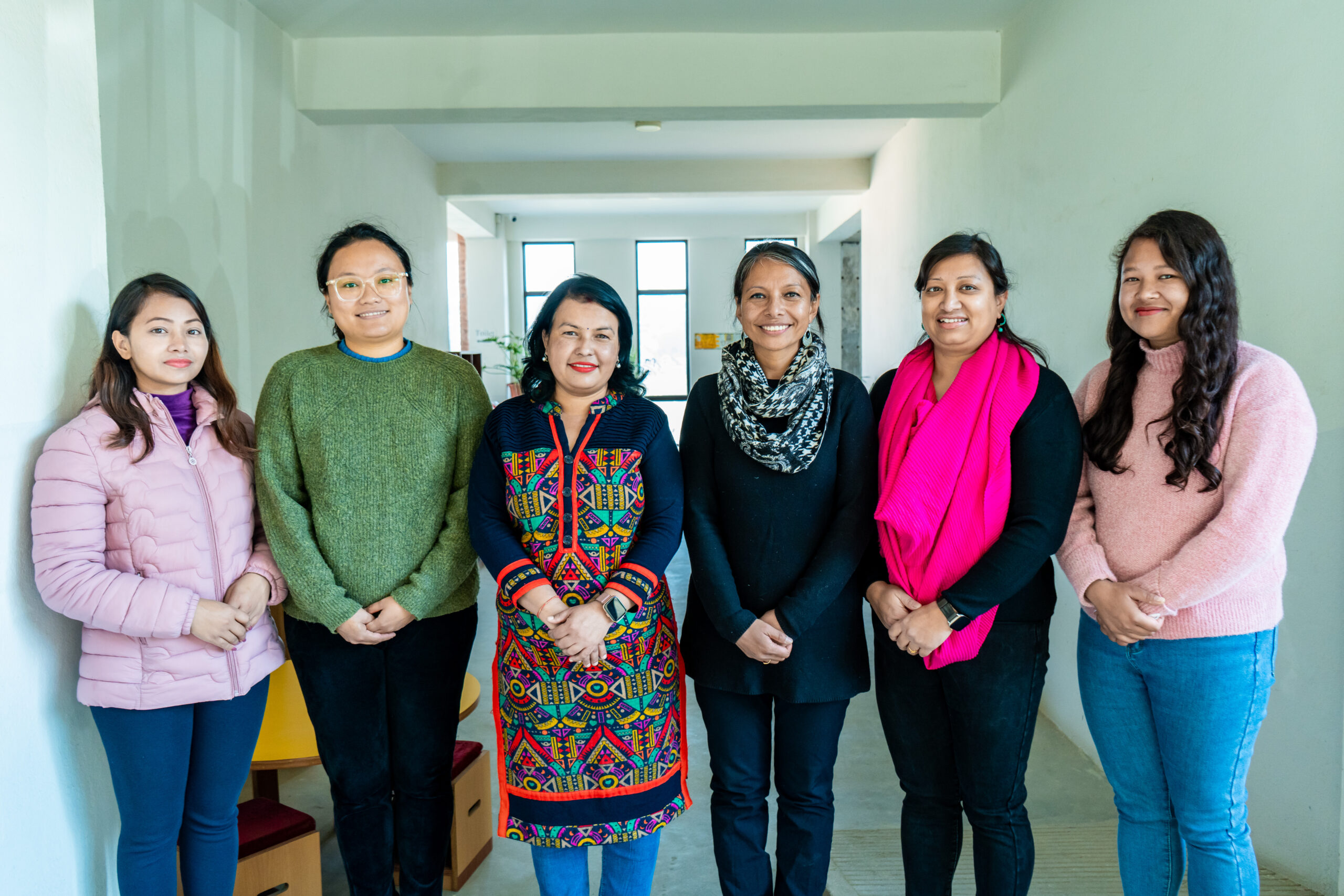
Childhood Trauma
Childhood trauma is severely disruptive to healthy development. Impacts can last a lifetime, long after a child has been removed to safety. Some common symptoms of those with unprocessed childhood trauma include poor self-care, self-harm, interpersonal struggles and difficulty with authority, trouble expressing emotions (both extreme reactivity and numbing), and more.
Trauma impacts the part of the brain called the “orbitofrontal cortex,” Dr. Chhori Laxmi Maharjan explains in her dissertation. The orbitofrontal cortex oversees complex decision-making, managing the balance between our emotions and analytical thinking. Disruption to its normal development results in learning and behavior problems, and even developmental delays and physical illnesses.
These disruptions include traumas like extreme poverty; homelessness; neglect and/or abuse; a parent’s mental illness or chronic or terminal illness; abandonment or death of parents; natural disasters (like the 2015 earthquake) or wars (like the Nepali Civil War from 1996-2006); displacement; bullying or stigma—and many more.
To “rescue” a child from childhood trauma, the first step is to do everything possible to interrupt that traumatic situation, providing a safe, stable environment with safe, stable adult caregivers. Helping these children to cultivate as many healthy relationships as possible is a crucial protective measure for emotional and mental well-being.
But this is only the beginning, as it does not undo the harm already sustained by the growing brain.
In order to set healthy brain development back on course, it is crucial to also provide these children with the care, support, tools, and space necessary to grapple with these complex, frightening experiences.
The tremendous success of all of NYF’s programming is due to our team’s keen understanding of the importance of mental health care for childhood trauma survivors. Chhori is a leader in ensuring all of NYF’s physical interventions are strengthened, supported, and sustained by robust mental and emotional care as well.
Sandplay Therapy
Ankur Counseling Center uses many different therapeutic approaches, but sandplay therapy is Chhori’s specialty.
For both adults and children, a common symptom of traumatic stress is an intense struggle to articulate the experience in a way that is organized and linear while also sufficiently capturing the complex layers of distress behind the narrative. This is because part of what makes an experience traumatic is its scale, scope, and impact on so many pieces of an individual’s life. The brain’s inability to untangle and sort this tremendous snarl is itself a major facet of the trauma. This is especially true for children, whose brains are still developing their baseline understanding of the world.
Sandplay therapy bypasses the factual story of the trauma entirely. It instead capitalizes on a child’s natural ways of learning: imagination, creativity, and pretend play. In much the same way healthy children will explore their worlds in miniature by playing house, acting out stories with their toys, or making up elaborate playground games (taking advantage of the options to swap roles, add dramatic surprises, adjust the rules, go back to change the ending, and more), a child grappling with trauma can use play to safely navigate the major sources of distress within their traumatic histories.
How Sandplay Therapy Works
In Chhori’s counseling room, a child is presented with trays of sand and many shelves of miniatures representing all parts of life and fantasy: figures of men, women, children, and babies; superheroes and villains; houses, castles, schools; gods and goddesses; trees, dump trucks, rubber duckies, dinosaurs, frying pans, puppies, and more. The child is invited to gather as many items as he or she wishes, and to create a world within the sand tray.
Chhori watches patiently as the child creates the world, careful not to interrupt the process. Some worlds—often in the beginning of a child’s journey—are highly disorganized, overwhelmed with figures in chaotic relation to one another. Other worlds are quite sparce, with figures appearing far away from one another. Still other worlds reveal consistent themes, like villains lurking in the shadows, families being reunited, or community roles.
When the tray is complete, Chhori asks the child if their creation has a title, or if they’d like to walk her through the world they’ve created. Certain figures clearly have more significance to the child than others—perhaps a specific problem the figure has encountered. Letting the child lead as much as possible, Chhori lets the tray become the subject, with the child explaining about the characters, their relationships to one another, their desires, and their struggles. Discussions emerge naturally from this process, allowing the child to gently explore challenging themes from a safe distance, and as the expert in control of their own created world.
The results are transformative, as children gradually peel through the layers in this safe, affirming environment, gently processing their trauma piece by piece.
And, wonderfully, sandplay therapy is a useful technique for children from virtually any cultural background. It’s especially crucial in a country like Nepal, where children come from many different subcultures.
A Day in the Life
Dr. Chhori Laxmi Maharjan has a very full daily schedule, touching on every NYF program in one way or another.
“Usually, my day starts with providing one-on-one counseling sessions,” she says. Chhori has an average of four individual sessions per day, each lasting 30-50 minutes. Most of her patients are children and youth, including Olgapuri Children’s Village kids, NYF Scholarship recipients, and children referred from other children’s homes or nonprofits working with families in Kathmandu Valley.
Twice a month, she also leads 90-minute group therapy sessions.
After each counseling session, Chhori makes careful session notes to document each patient’s progress. Occasionally, if necessary, she meets with parents or guardians.
Chhori also provides clinical supervision sessions with the rest of the Ankur team (currently six counselors, each with a master’s degree) and mental health professionals from other organizations.
Afternoons are for larger projects. Some days, Chhori leads trainings and workshops for mental health professionals, teachers, parents and guardians, social workers, and other people who work with children and youth.
Innovative Trainings & Workshops
Some of these trainings are for NYF’s teams, while others are specifically for organizations with missions that complement ours. For example, Chhori recently led a several-day workshop for staff members at a Kathmandu Valley women’s shelter which had been struggling with behavior problems from some of the children receiving services there. The training focused on trauma-informed discipline: methods of effectively addressing problematic behaviors in ways that recognize and honor the chaotic, frightening, and painful circumstances these children were responding to. Professionals who received this training responded with glowing appreciation. They have already seen remarkable improvement in their interactions with the children in their care.
Other trainings are part of larger NYF programs. Women in our Olgapuri Vocational School Industrial Tailoring program receive empowerment and goal-setting workshops as part of their curriculum. These students frequently report that these workshops were their favorite part of the training!
And, of course, Peer Counseling training is a major facet of the Caste Equality Project (CEP). Chhori is leading this program, working closely with CEP Coordinator Lalit Gahatraj to ensure our 30 Saptari District peer counselors are supported and empowered in their mission to begin building their community members’ self-confidence, overcoming generational trauma, and daring to seize opportunities to participate fully in Nepali society.
Community Mental Health Program
Mental health problems are very common across Nepal. But unfortunately, awareness of mental health concepts are still very low, even in urban areas. During the height of the COVID-19 pandemic, rates of mental health crisis spiked. At the same time, Ankur Counseling Center’s reach extended further than ever before.
During NYF’s rapid pivot to lockdown-safe programming, Chhori’s team was the first to introduce remote services. And soon, Ankur Counseling Center had expanded their offerings to include services to local women experiencing domestic violence, support for front-line healthcare workers, and training for other organizations serving women and children.
The COVID lockdowns showed local governments and other changemakers how important mental health care is. In mid-2023, the government of Lalitpur Metropolitan City (the area of Kathmandu Valley where NYF’s offices are) invited Ankur Counseling Center to launch a Community Mental Health Program. Chhori has been leading this important work ever since. So far, she has introduced monthly “Mental Health Desk” activities in local schools, organized World Mental Health Day celebrations, and provided mental health awareness training for students, teachers, healthcare workers, social workers, and traditional healers.
What’s Next?
Dr. Chhori Laxmi Maharjan is involved with many Kathmandu-based organizations focused on mental health. She’s passionate about applying the world’s best understanding of psychology to a Nepali cultural context.
Most psychological care techniques today were developed in Western cultures, which in many ways are very different from Nepal’s society! As a result, some care techniques which are very effective for an American mindset or worldview are not culturally appropriate for Nepali patients. However, Chhori understands the scientific basis for these techniques. She and her network of Nepali psychology experts are deeply interested in studying which of these approaches may have promise in a Nepali context, with a few culturally minded tweaks.
Meanwhile, she says, “Personally, I feel NYF is my second home. My values match with NYF’s values.” Our organization gives her a sense of belonging and of a meaningful life. And because NYF is structured with trust in our on-the-ground experts, Chhori has plenty of opportunities to stretch her expertise as far as she is able.
“Working more than 15 years with children and youth, I have learned that suffering can be reduced or prevented by cultivating compassion,” Chhori says. “I can see the hardships in the community—and opportunities for community transformation.”
NYF is deeply proud of Dr. Chhori Laxmi Maharjan and the work she is doing to advance mental health care in Nepal—especially for children and survivors of trauma.
You are not alone. If you or someone you know is experiencing a mental health crisis or thoughts of suicide, get help right away. You can contact your physician, go to your local ER, or call the suicide prevention hotline in your country. For the United States, you may call or text the Suicide Prevention and Crisis Hotline at 988. You can also message the Crisis Text Line by texting “HOME” to 741741 or visiting https://www.crisistextline.org/. Both programs provide free, confidential support 24/7.
One Year of the Community Mental Health Program!
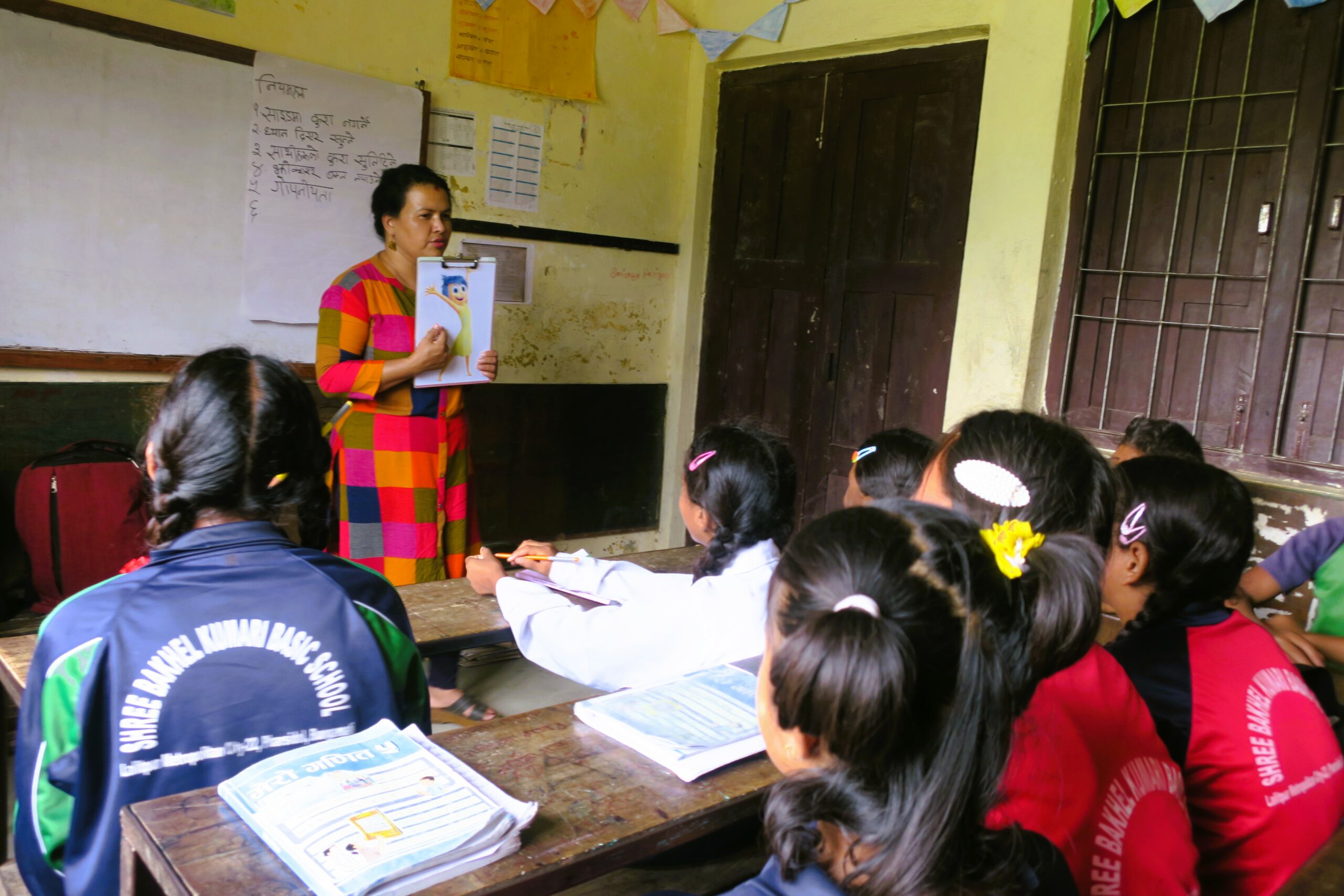
We’re thrilled to celebrate one year of success with our Community Mental Health (CMH) program! Last July, Ankur Counseling Center, in collaboration with Lalitpur Metropolitan City, Ward 22, embarked on a mission to fight Nepal’s growing mental health crisis. The new program will increase access to mental health services and raise mental health awareness in communities across Nepal, starting here in Lalitpur.
The Community Mental Health program mainly includes:
- Monthly Mental Health Desks (also called Man Chautari)
- Mental Health Awareness Training
- World Mental Health Day Celebrations
In close collaboration with community leaders, youth leaders, schools, and healthcare workers, the Community Mental Health program is raising mental health awareness, identifying and addressing mental health issues, and preventing suicide among adolescents and adults.
Click here to see photos of the launch on Instagram in July 2023.
Mental Health Desks (Man Chautari)
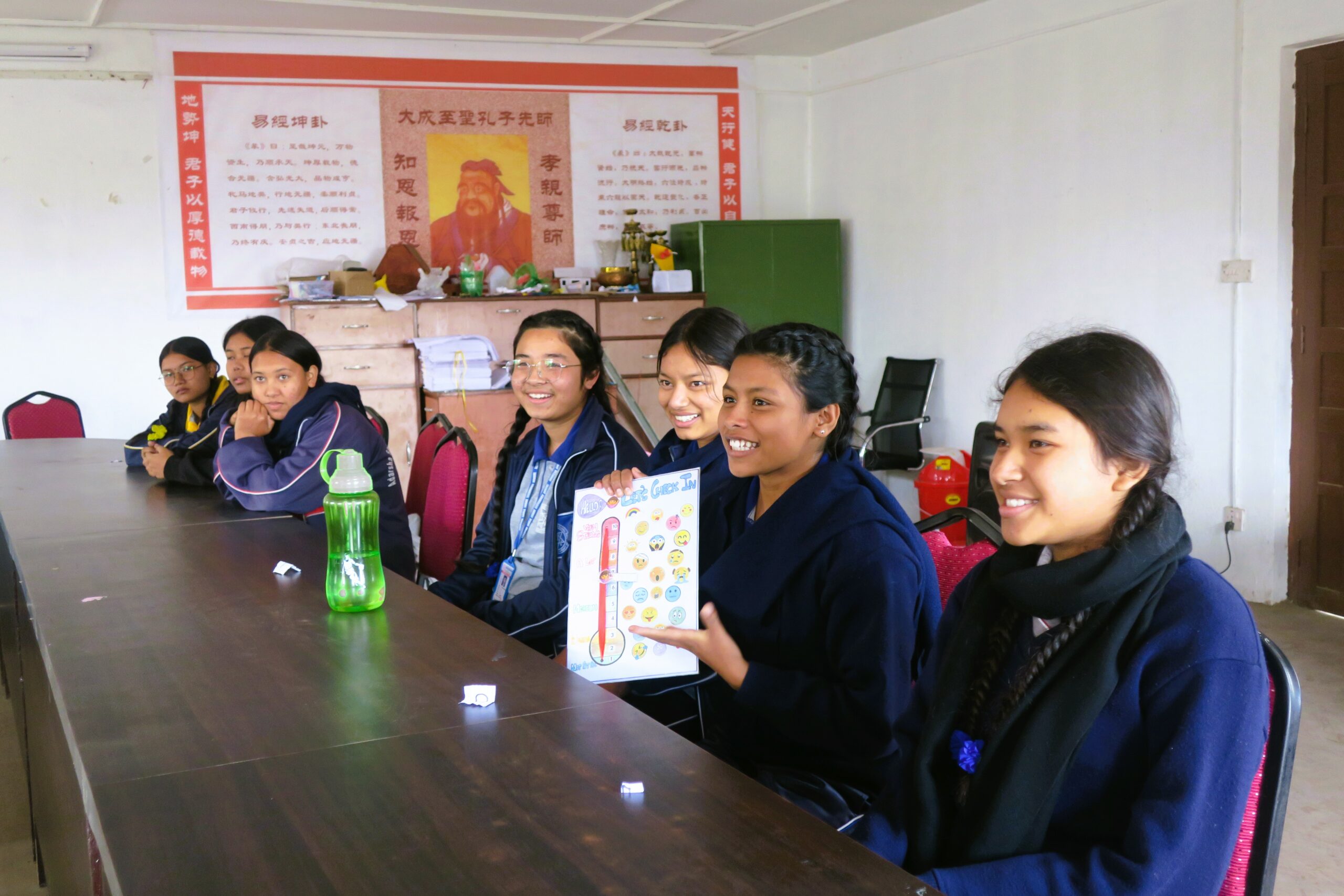
Mental health awareness is extremely low in Nepal, so our Ankur Counseling team is starting from the ground up to build a better community understanding of mental wellness as a concept.
School- and community-based monthly mental health desks, or Man Chautari, provide children and adults a safe place to share their feelings with peers and counselors, individually or in groups, thus normalizing the act of exploring mental wellness in community.
Ankur counselors have been instrumental in conducting these Man Chautari sessions at Adarsha Saula Higher Secondary School, Bakhel Kumari Basic School, and a single women’s group in the community. Additionally, they lead thematic sessions on various psychological topics, further enriching these gatherings.
Mental Health Awareness Training
To strengthen mental wellness skills among community leaders and stakeholders from Ward 22, Ankur conducted two three-day training events this past year focused on counseling and effective communication. Participants included schoolteachers, health workers, and volunteers from other local social service organizations.
After the completion of the training, participants gained a deeper understanding of mental health factors and the significance of counseling. Those who attended are not only better equipped to identify psychological issues among their clients, but also offer counseling, and refer cases to Ankur as needed. Even more, participants learned to recognize and interact in a nurturing manner with individuals exhibiting suicidal tendencies.
In Ward 22, where mental health challenges and suicide rates are significant, participants strategized to raise awareness and prevent suicide. A 2023 survey conducted by the Community Mental Health Program revealed that 26% (80 out of 310) reported experiencing suicidal thoughts. Additionally, police reports recorded 13 suicides last year in a population of around 8,000. Our team aims to lower these rates and improve community access to quality mental health care.
We are encouraged by the progress made in training community leaders and stakeholders in Ward 22 to address mental health challenges. Therefore, the Community Mental Health Program will continue to place a significant focus on suicide prevention by equipping participants with the skills to recognize and support individuals with suicidal tendencies. Our comprehensive approach includes raising awareness, providing counseling, and ensuring access to quality mental health care. As a result, we are creating a safer and more supportive environment for everyone in Ward 22, and beyond.
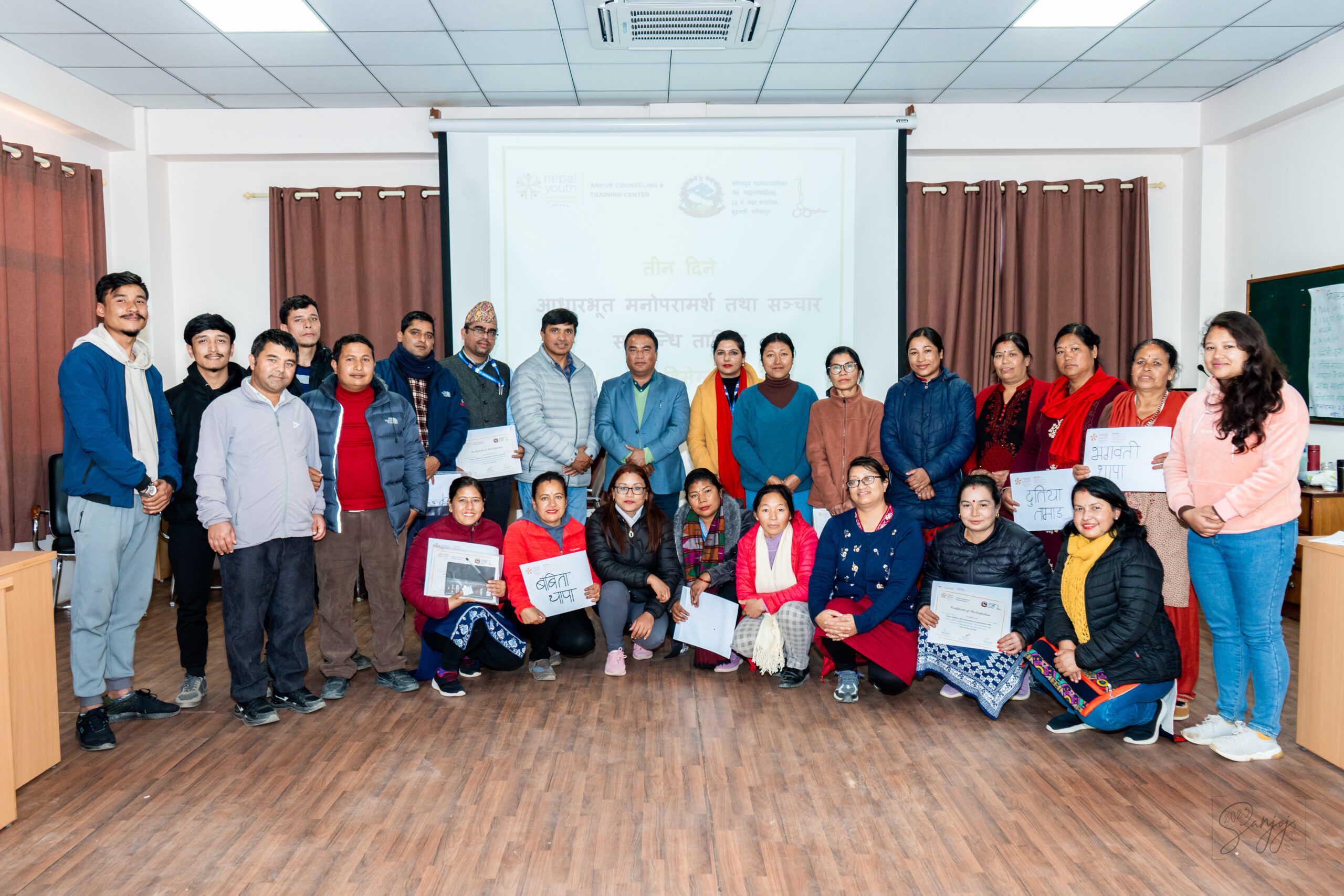
Creative Movement Therapy (CMT) Training
A group of healthcare workers and community health volunteers, participated in Creative Movement Therapy (CMT) training at Ankur Counseling Center. CMT is a psychotherapeutic framework that utilizes the mind-body connection and movement to release emotional and physical stress.
World Mental Health Day Celebration
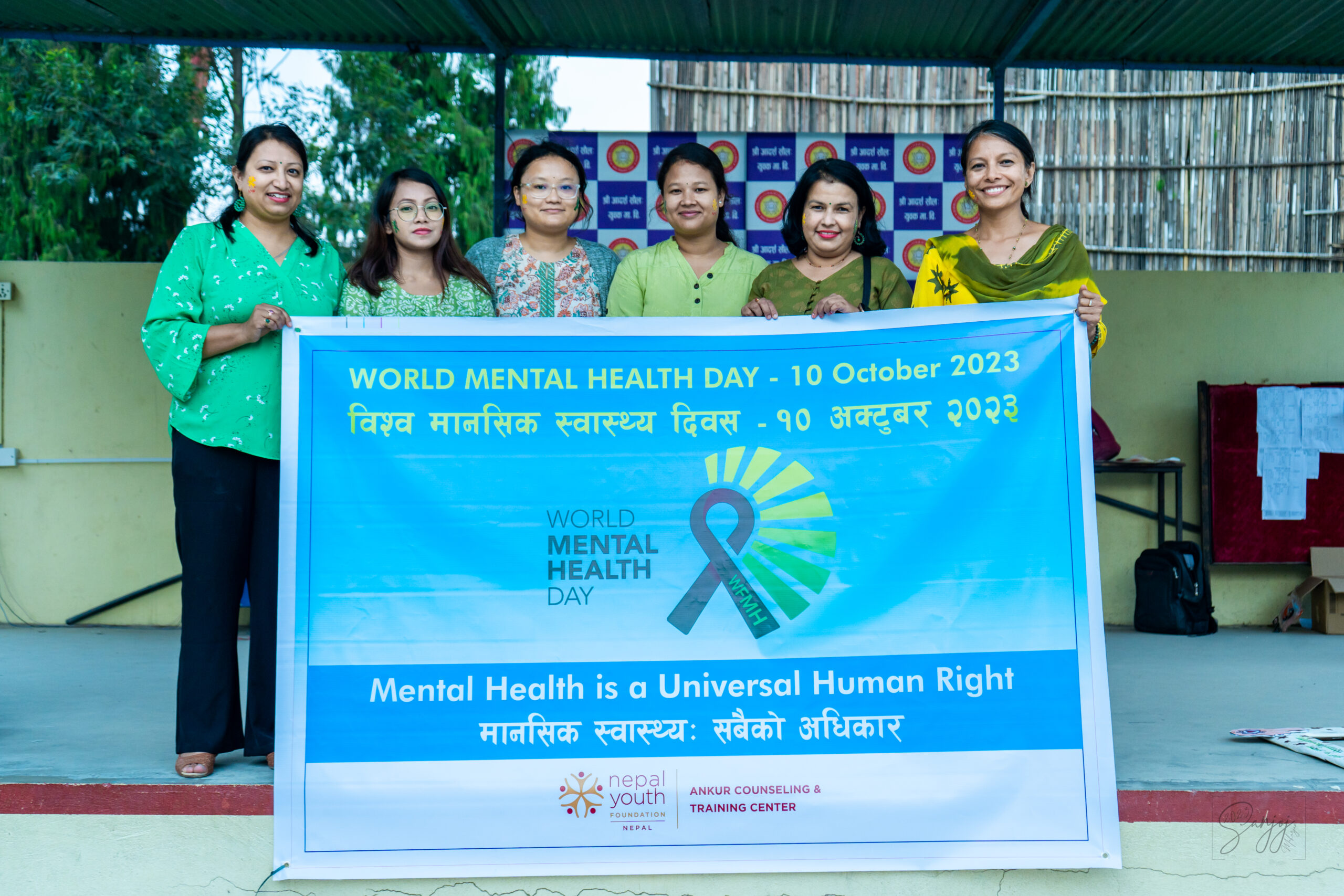
NYF celebrates World Mental Health Day every year on October 10th. This last year was no exception—with special mental health awareness programs focusing on schools. Ankur organized art competitions, poster presentations, speeches, and face painting at Adarsha Saula Secondary School. The program was chaired by the Chairperson of Ward 22, Lalitpur Metropolitan City and attended by students and teachers.
Click here to see photos from World Mental Health Day on October 10, 2023.
We extend our heartfelt thanks to our community of donors for their unwavering support of Ankur and this program. Your contributions make a significant difference in our efforts to address mental health in Nepal. As we look to the future, we are excited about the continued growth and impact of this initiative. Ankur, Nepal’s original child-focused counseling center and a leader in mental health awareness, is proud to take this important step forward. Together, we are paving the way for a brighter, healthier future for communities across Nepal.
You are not alone. If you or someone you know is experiencing a mental health crisis or thoughts of suicide, get help right away by contacting your physician, go to your local ER, or call the suicide prevention hotline in your country. For the United States, you may call or text the Suicide Prevention and Crisis Hotline at 988 or message the Crisis Text Line by texting “HOME” to 741741 or visiting https://www.crisistextline.org/. Both programs provide free, confidential support 24/7.
2023 Impact Stories: Thank you!
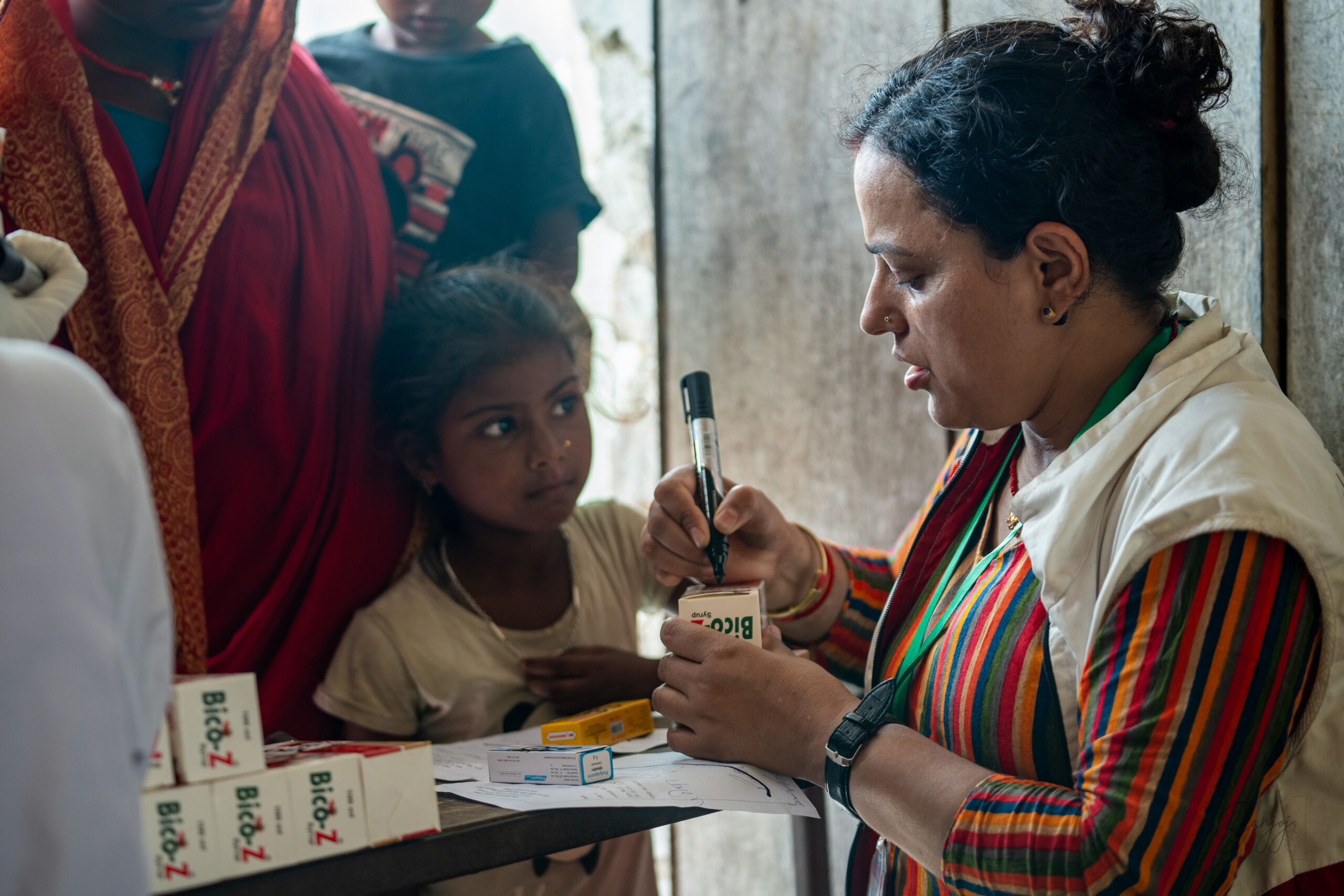
(Above, Caste Equality Project in April 2023) – NYF nurse Radhika Sapkota dispenses multivitamins for children who have completed their check-ups at the Nutrition Outreach Camp. No one in 7-year-old Esha’s* household can read, so Radhika explains the dosage in a bit more detail to Esha’s mother. As she does so, she makes some simplified marks on the vitamin box to help her remember the instructions.
2023 Reflections & Highlights
As we begin the new year, our global team is deeply grateful for everything we accomplished with your support last year:
- In February 2023, NYF celebrated the 25th anniversary of the opening of our flagship Nutritional Rehabilitation Home.
- Our first 16 Educating Dalit Lawyers scholarship recipients officially entered law school. They are impressing their professors with their passion and dedication to the law.
- Over the summer, our nutrition team helped launch the Caste Equality Project in Saptari District. They provided nutritional outreach and care to over 5,000 children and their caregivers.
- In July, Ankur Counseling Center launched a Community Mental Health program to nurture mental wellness and empower individuals to recover from mental health crises.
- Our Kinship Care program is now providing enriched care to keep girls in school, lowering the risk of child marriage.
- We expanded the mission of our New Life Center to offer services to children visiting Kathmandu for critical medical services.
- And thanks to careful observations and learnings from our work during the COVID-19 pandemic, we re-envisioned our Olgapuri Vocational School “satellite” trainings. They are now more impactful than ever in upgrading the standard of living in rural villages.
The above are just a handful of highlights from our work in 2023. And while we’re proud of these accomplishments, we know that the real impact NYF makes are shown in the individuals we work with. So on that note… we wanted to compile and share some of our favorite stories from 2023!
We hope these stories showcase NYF’s love, care, and commitment for the youth and families we work with. We also hope you feel proud of the impact we are making together every day.
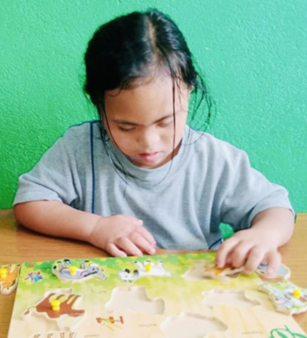
Kriti*
Scholarships for Students with Disabilities
Seven-year-old Kriti* loves puzzles, picture books, and making new friends. But because schools equipped for students with intellectual or developmental disabilities are rare in Nepal, Kriti (who has Down syndrome) has spent most of her life at home, unable to attend classes like the other children she likes to play with.
NYF has offered Scholarships for Students with Disabilities for over 30 years, but until now, these scholarships were limited to students with physical disabilities, like deafness or mobility challenges. This was due to the limited number of safe schools for students like Kriti.
NYF is so pleased that this has changed in recent years. Our team of social workers have assessed several Kathmandu Valley schools for students with special intellectual or developmental needs. Three of these schools have inspired our team’s confidence enough that we have opened the Scholarships for Students with Disabilities
scholarship program to include students living with intellectual disabilities. In 2023, we welcomed 23 such children into this scholarship category!
Our social workers have made valuable connections within these schools, allowing for open dialogue about each student’s needs. NYF is also engaged with the parents of these children, who are tremendously relieved to know that resources are available to help families like theirs provide safe, loving, encouraging educational care for their children.

“NYF … has a philosophy of ‘working themselves out of a job’. Truly unique among NGOs, NYF will choose a mission, will create solutions and then hand off the new model to local people to run. This is not only a very respectful and sustainable model, but it also frees up the organization so they can tackle the next challenge.”
— Sheila, Supporter
Chandra*
Kinship Care
Grandpa, or Hajurba Kumar, is raising Chandra, 14, whose father died in an accident many years ago. Chandra’s mother remarried soon thereafter. Her new husband’s family refused to accept her son into their family, since he was not part of their paternal line.
Chandra’s grandparents stepped in to provide the little boy with a stable home. This allowed their daughter, Chandra’s mother, the opportunity to build a more stable life for herself as well, in a social context that is often extremely challenging for single mothers without the education to support a good-paying career.
Today, Hajurba Kumar, now widowed, is raising Chandra. Chandra is Hajurba Kumar’s pride and joy. The loving, supportive connection between them is warm and strong. This has provided Chandra with a wonderful foundation as he enters his teenage years.
An NYF Kinship Care stipend has kept this family together as Hajurba Kumar ages. Your support is allowing them to prioritize Chandra’s education without worrying about the money required to keep this growing young man properly fed as he enters his voracious teenage years!
Chandra is currently thriving in the 8th grade. He routinely scores in the top five students of his class. He has a great future ahead of him, and we are so grateful to you for making it possible.
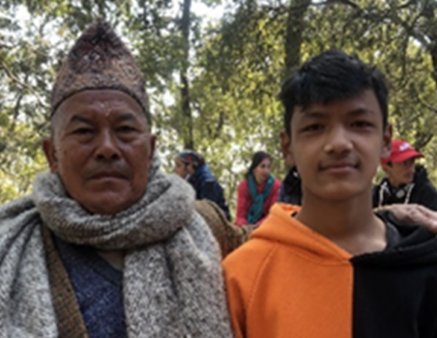

“Taking on herculean tasks, NYF has tackled Nepal’s biggest obstacles and continues to drive change. So many lives have been impacted as a result of this work.”
— Andrew, Supporter
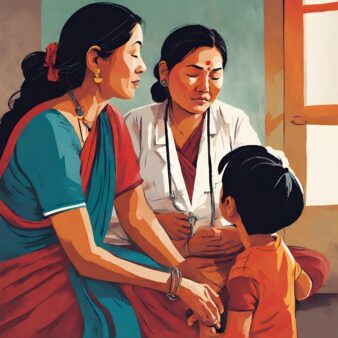
Bhagwati*
New Life Center
Bhagwati*, 34, lost her husband several years ago. His death revealed a secret that would drastically impact her life, and the lives of her two young children. He had been living with HIV, and, fearing the devastating social stigma of this diagnosis, had not disclosed his status to anyone, not even Bhagwati.
Soon after his death, Bhagwati began experiencing frightening symptoms of her own. “Weight loss, persistent cough, and difficulty breathing became a part of my daily struggle,” she says. “I visited the hospital, and when the doctors saw the seriousness of my condition, I was referred to a special hospital in Kathmandu.”
In early 2023, Bhagwati was diagnosed with HIV. To her dismay, her youngest son was also found to be living with the virus. She felt as though her entire life was crashing down around her.
When Bhagwati’s health had stabilized enough for a transfer, the hospital referred her and her son to the New Life Center. There, she would learn techniques for managing her son’s health, as well as her own.
“Our stay at the NLC proved transformative,” Bhagwati says. “Our care was all-encompassing—nutritional meals, essential medications, crucial lab tests, and, most importantly, counselling services to address our emotional well-being. We were discharged after a three-month stay, armed with medicine and a newfound resource when we need it the most.
“Since then, we have been taking our antiretroviral treatment regimen. The journey hasn’t been without its challenges, but we’re not alone. The project staff that had become our pillars of support during our time at the NLC continue to stand by us. Whenever hurdles arise, they’re there, offering guidance and a helping hand.”
(To protect Bhagwati’s privacy, this illustration was created by AI based on photos from the NLC.)

“As a donor, I have been involved with Nepal Youth Foundation for over 15 years and have supported a young girl’s education from high school all the way through medical school. She has become a successful surgeon and is making a contribution to the Nepalese society.”
— Yat-Ping, Donor & Volunteer
Nisha*
College Scholarship Program
Nisha* was raised in NYF’s care, so our team was deeply proud to witness her receiving her diploma from one of Nepal’s top universities this year!
A bright student with a sparkling presence, Nisha has dreamed of a career in the media for a long time. Her new degree in Media Studies from the School of Arts at Kathmandu University (and her stellar GPA) have already landed her a job in the media department at a travel company, where she’ll gain excellent on-the-job experience.
Someday, Nisha hopes to team up with other young media professionals to make a big difference for communities across Nepal. Thank you for helping Nisha, and many other young people like her, access the education that opens these remarkable opportunities!
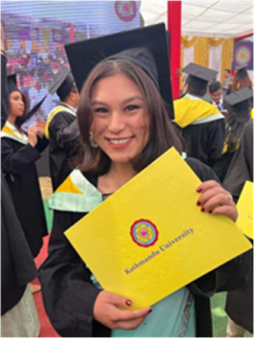

We are thrilled to be supporting NYF for such outstanding work they are doing to improve the quality of lives of children in Nepal through education.
— Sunita, Supporter
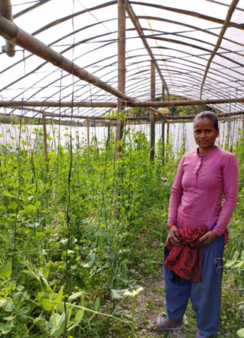
Pooja*
Vocational Training & Career Counseling (SAAET Project)
Pooja*, 33, lives with her husband, mother-in-law, and three children. She can’t remember ever having attended school, though she can read Nepali if given enough time to focus. Her family doesn’t have much, relying primarily on daily income her husband earns from taking on daily labor jobs. Pooja had to ask him for money for every basic expense. This caused a great deal of friction in the relationship.
For this reason, Pooja aspired to have an income of her own, to support her children and family and to fulfill her own needs as well. She learned about the SAAET Project from her local women’s co-op group and took part in the October 2022 session.
She constructed her first greenhouse quickly after completing the training session. By late January 2023, she had already sold an entire crop of cauliflower. Encouraged by this success, she added a second greenhouse, where she planted peas and green beans. By spring, Pooja was handling basic household expenses on her own—which transformed her previously-tense relationships with her husband and mother-in-law.
Pooja’s husband realized if he helped with the greenhouses, he could bring in more money for the family than his daily labor did. In strong partnership, he has joined Pooja’s endeavor, and they are now investing some of the year’s profits in a third greenhouse.

“The DH Ross Foundation has made a number of grants to NYF over the last 20 years. We have been consistently impressed by their work providing a range of educational and health and nutrition services to children and youth, and are glad to support their vocational training and health outreach work.”
— Ken, Partnering Organization
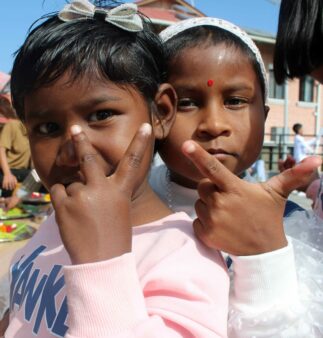
Mina* and Rupa*
Olgapuri Children’s Village
In February 2023, a temporary shelter home referred sisters Mina*, 4, and Rupa*, 3, to Olgapuri Children’s Village.
Mina and Rupa are very close, and very bright. They’re now both attending kindergarten and doing quite well. When they were found by the original shelter, they were determinedly caring for each other the best way they knew how, having been failed by all of the adults in their lives. Our team is thrilled that their days of fending for themselves are over. These sisters deserve a normal, healthy, nurturing childhood—and that’s exactly what they’ll receive at Olgapuri Children’s Village.
Mina and Rupa’s parents married against the wishes of their mother’s family. Their father belonged to a Dalit caste (formerly known as “untouchable”). As a result, their maternal grandparents rejected the entire family.
Family life proved too much of a struggle for the girls’ father, who abandoned the family during the COVID-19 pandemic. Soon thereafter, their mother (who was still rejected by her parents) remarried and started a new life in India with her new husband, leaving her children behind. Even then, Mina and Rupa’s maternal grandparents refused to take them in or even acknowledge them, due to their caste status.
Mina was born with a hearing challenge, and when she arrived at Olgapuri, she was unable to hear or speak. She also hadn’t been exposed to Nepali Sign Language, though she and her younger sister Rupa made good use of a “home sign” language that they developed together organically.
We are amazed at the progress the girls have made. Mina, who is skilled at lipreading, eagerly devoted herself to learning to write in her special-needs kindergarten class. She was awarded first place in her class for handwriting, bringing home a prize of several notebooks, new pencils, pencil sharpeners, and good-quality erasers! The children and house parents at Olgapuri quickly learned how to communicate with her, and they have surrounded her with warmth, kindness, attention, love, support, and safety.
Thanks to a special medical grant from a committed donor, Mina received a cochlear implant over the summer, which is allowing her to hear for the first time. She’s picking up new skills very rapidly and now attends school in the main classroom.
Meanwhile, Rupa—who at age 3 is already her sister’s fiercest advocate—no longer needs to help her sister navigate the world safely. Rupa is enjoying her classes, as well as opportunities to play with other children. She is making connections and relaxing into the stable rhythm of Olgapuri life. She’s experiencing holistic security for the very first time. The girls now have a large, loving family of healthy, attentive adults to meet their needs. And older siblings with ample time and attention to share!

We support NYF because the programs are community-based/grassroots, carried out by Nepali staff (who understand local needs) and are focused on education and health, especially for the benefit of children and young adults.
— Ann, Supporter
Rajendra*
Educating Dalit Lawyers
Rajendra* is from Doti District, a hilly region in far western Nepal. He grew up in a home shared with his parents, two brothers, one sister, and his grandmother.
Overt casteist violence and discrimination were a common occurrence in his hometown. But he also witnessed his neighbors pushing back. Once, he recalls, local police refused to act against a group of casteist young adults who were making a campaign of harassing and abusing Dalit people in the area. Local Dalit families bypassed the local authorities and lodged a case with the district level police. The perpetrators were held accountable and charged a penalty!
Watching this case unfold in real time provided great insight to Rajendra about legal terms and procedures, the importance of law and justice—and ways the law could transform conditions for families and communities like his.
Rajendra was honored to earn an EDL scholarship. He was even more excited when he learned he’d won a seat at National Law College in Kathmandu, one of the best schools in Nepal.
A year into the program, Rajendra is thoroughly enjoying the learning environment at the college. He’s impressed with the quality of the teachers here, and with their teaching methods. When he identifies areas of weakness in his own skill levels, he immediately begins strategizing ways to improve.
Rajendra is tremendously grateful for the Educating Dalit Lawyers scholarship opportunity. He’s looking forward to defending the rights of his community as a fully-fledged lawyer!
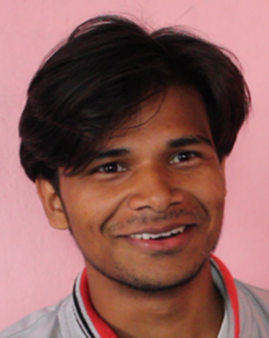

“NYF is addressing important big-picture issues in Nepal without losing touch with the individuals they are serving. “
— Anonymous, Donor
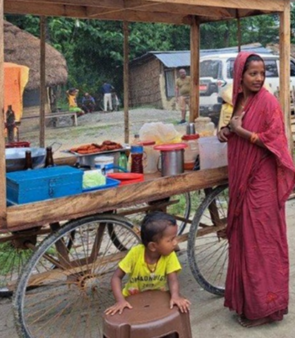
Shanta*
Caste Equality Project, Nutrition Outreach Camps, Vocational Training and Career Counseling
Shanta*, 23, attended one of NYF’s April Nutrition Outreach Camps in Saptari District with her 2-year-old son, Amar. She was very grateful for the opportunity to have her precious son seen by a pediatrician. And she was relieved that NYF was working with local health workers she knew and trusted. Shanta and her family are from the Madhesi Dalit subcaste, so opportunities like these are very rare.
The pediatrician diagnosed Amar with mild malnutrition, but Amar was in otherwise good health. There was no need to refer him to an NRH. Instead, Shanta and Amar sat down with NYF’s nutritionists to discuss practical, affordable strategies to improve the boy’s nutrition at home. During this discussion, Shanta shared details about her background. She had only attended school long enough to write her name and cannot read or write.
She married at age 19. Her husband spends most of the year performing backbreaking migrant labor in Saudi Arabia. Shanta is raising Amar on her own, and she is also responsible for caring for her aging in-laws.
Sending Shanta’s husband and his brother for work in Saudi Arabia was very expensive, and the family incurred a great deal of debt to do so, all in the hopes that the effort would result in better financial stability moving forward. Unfortunately, the investment hasn’t paid off, and Shanta misses her husband terribly.
Shanta has tried to grow wheat and other crops on the tiny plot of land she shares with her in-laws, but the meager earnings from this have never been enough to sustain the family. She frequently goes without meals to ensure her son and her in-laws can eat.
NYF’s Nutrition team made thorough notes during this discussion, and during nutritional counseling sessions with other families. When they returned to Kathmandu Valley, they had a list of early suggestions for Lalit Gahatraj, the CEP Coordinator. Shanta’s story was similar to those shared by many other families. The team suggested that running one of our “Tea & Snacks Shop” trainings in the area would be an impactful start for some of the families we had met.
When NYF announced that they would run an experimental session to assess the effectiveness of these businesses in the region, Shanta signed up eagerly. She completed the training in June 2023. She received her food cart, cooking tools, and other start-up support, and launched her new street food business.
During the first few days, she was already making a profit of 500 rupees per day. This is roughly on par with Nepal’s minimum wage. On big farmer’s market days, she brought in double the money. Amar comes along with his mother and enjoys “quality testing” each batch of snacks. He’s also enjoying a greater variety of fresh vegetables, which Shanta purchases in the markets she works in.
Shanta has quickly developed a sense of her clientele’s preferences, and she is bringing in more income with each month. Her success has been transformative. Soon, she hopes to call her husband back home to Nepal so they can expand this new business and live together as a family. She is confident that together, they can bring in just as much income—if not more—than the wages he is earning in Saudi Arabia.
Support from friends like you make these transformations possible. As we move through 2024, we’re looking forward to the possibilities of the life-affirming transformations in store for the children we serve. Thank you, and dhanyabad!
Updates from NYF President Som Paneru
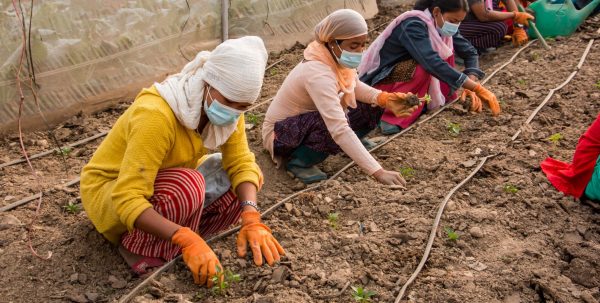
Dear NYF Community,
I hope you are all continuing to stay safe and healthy. Earlier this month, the Nepal government made an announcement to ease COVID-19 restrictions. Among other things, this included the physical re-opening of schools and public spaces. This decision has several impacts on our programs at NYF, and I am delighted to share these new updates with all of you.
COVID-19 Updates & Response Programs
NYF’s COVID Isolation Center at our flagship Nutrition Rehabilitation Home (NRH) ran until September 16, 2021. Since its opening, we’ve admitted and treated more than 240 COVID-positive patients at our facilities. Following this recent government decision to re-open public spaces, NYF suspended isolation center services on September 17th to fully resume our regular NRH programming. We are continuing to produce Lito, our homemade “super” flour, at the NRH and are still distributing them to communities in need via the Lito for Life program. For more updates and information about our COVID-19 response, visit NYF’s COVID Timeline.
Education
Until now, schools and colleges nationwide have been closed. Out of the 643 scholarship students NYF currently supports, 70% have been attending online classes run by their schools and colleges. After this most recent decision, most NYF children will likely be able to return to in-person classes later this fall. Additionally, after a massive COVID-related delay, the long-awaited examinations for grade 12 students finally took place on September 15, 2021. About 40 NYF students took the exam.
Vocational Education & Career Counseling
As you may recall, most of our vocational training programs were put on hold earlier this year. We are happy to announce that NYF has safely resumed some training programs in the electrical, welding, carpentry and plumbing trades. Effective last week, we have 4 vocational training satellite courses currently running. NYF is also preparing to complete 2 more Sustainable Agriculture and Entrepreneurship Trainings (SAAET) by the end of the year.
Nutrition Rehabilitation Homes (NRH) & Nutrition Camps
There are currently 8 children being treated at the NRH for malnourishment. We are expecting an increase in the number of admissions as we resume our regular services and programming. Our NYF nutrition staff is also busy strategizing how to safely conduct our regular nutrition camps this year.
New Life Center (NLC)
Due to travel restrictions brought about by COVID-19, patients had a difficult time traveling to the New Life Center in Kathmandu Valley to receive treatment. In order to increase access to supportive care for children living with HIV/AIDS in rural communities, NYF has redesigned the NLC program.
The aim of this redesign is to bring New Life Center resources to a larger population of children. To do so, we’ve moved beyond the “residential-treatment only” approach to an expanded “outreach and community-based” approach. According to the new plan, the NLC will cater residential services to approximately 20 children, while all the other services will be completed in rural communities via community outreach. These community outreach programs include awareness and advocacy, food and essentials delivery, financial support for caretakers, and tele-counseling services.
While this program will still be run from the NLC office in Kathmandu, we are excited to partner with a number of grassroots organizations — all doing incredible work in the communities we plan to serve.
Olgapuri Children’s Village
First and foremost, all 71 children (and house parents!) at Olgapuri remain safe and healthy. This year, nine students will soon be moving out after graduating high school. We are so proud of each graduate, and look forward to seeing them go on to do incredible things!
Thank you for your support.
Friends, we are deeply grateful for your continued love and support for the children, young adults, and families in our care. Thank you, also, to our staff on the ground in Nepal and for their incredible work. As always, if you have any questions about these updates or would like more information about our programs in general, please don’t hesitate to contact us at info@nepalyouthfoundation.org.
With gratitude,

Som Paneru
NYF President
Olga Inspires on CBS Evening News: Still Sharing Her Life’s Mission

Olga inspires just about everyone she meets, so the NYF team was delighted when CBS Evening News with Norah O’Donnell asked to feature her recently.
Viewers who tuned in for the spot’s original airing on the night of July 5th, 2021 learned a bit about Olga’s mission: extending educational opportunities to Nepal’s children, as well as providing health, freedom, and shelter.
We are so grateful to CBS News correspondent Jamie Yuccas for helping Olga inspire new audiences with her story of personal impact in a world that often downplays “women of a certain age”. With support and solidarity from friends around the world, Olga and NYF are helping Nepali children chase their dreams and build brighter futures for themselves, their families, and their communities.
“I don’t think about stopping,” Olga says. And neither does the global NYF team. Thank you all for being part of this incredible continuing journey!
You can watch the full segment on YouTube or Facebook. CBS Evening News also tweeted about this special segment, which can be viewed here.
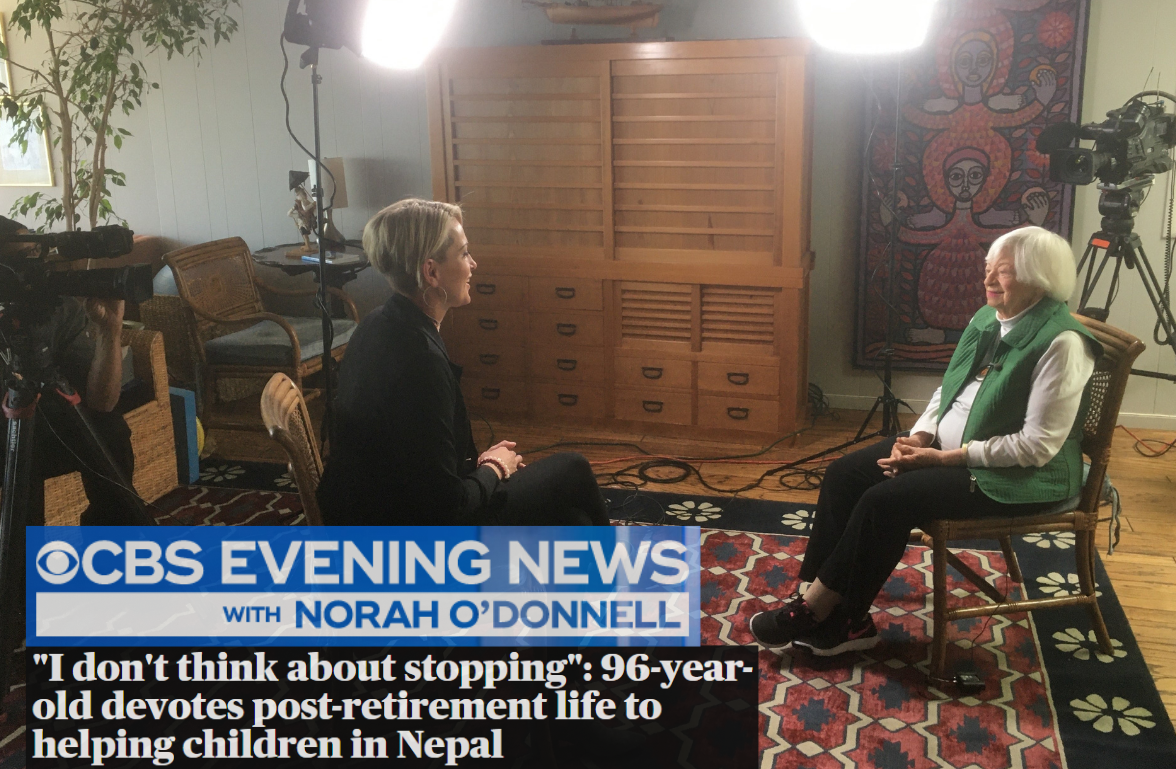
Keeping our Promises – An Overview of NYF Programming During a COVID Surge
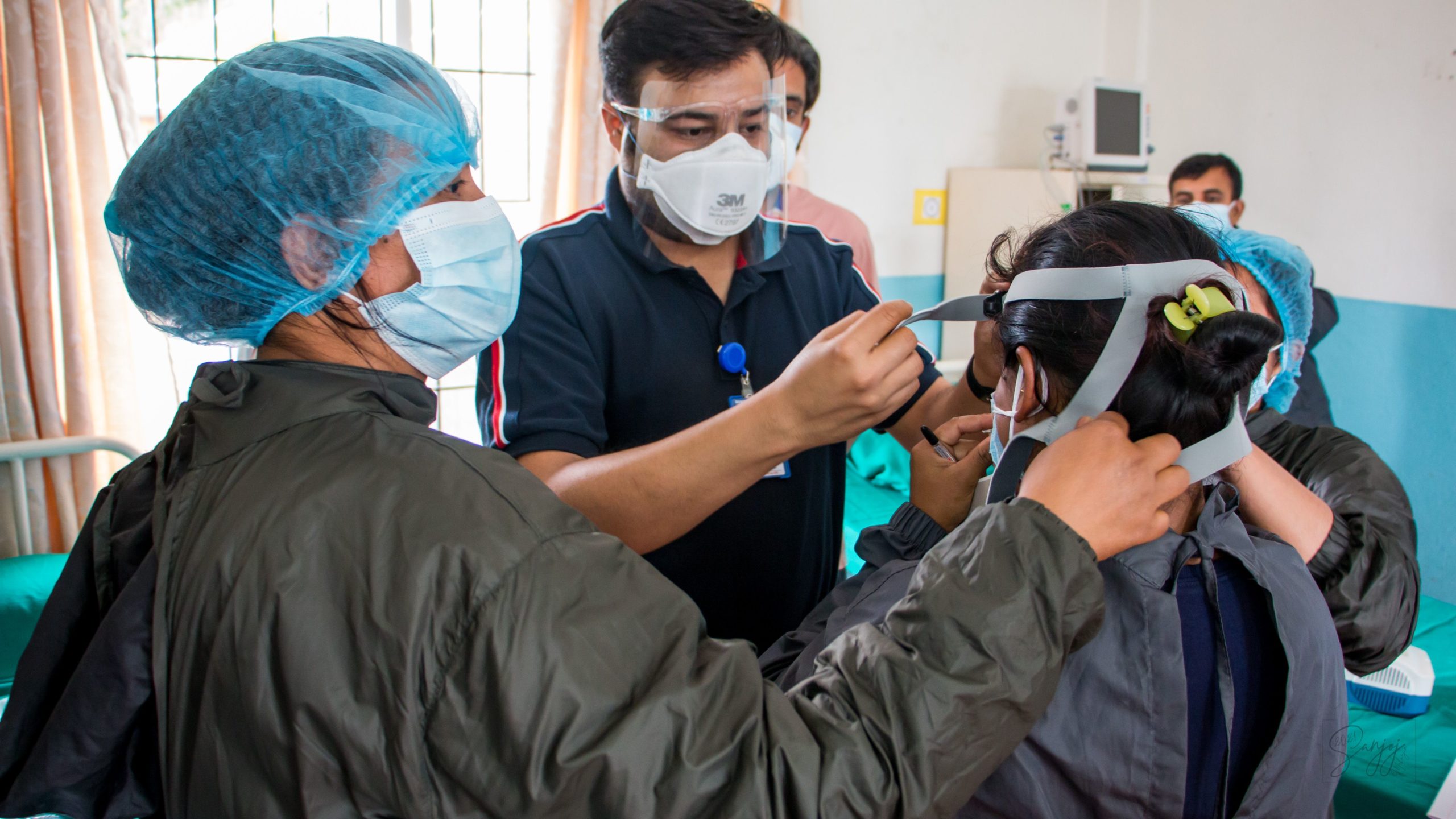
Keeping our promises to the children already in our care is of the utmost importance to NYF in ordinary times. But in these extraordinary times, we’re proving our commitment in ways that build trust, enhance lives, and ensure that the NYF community’s #LoveWorks.
As a follow up to Som’s interviews with the BBC on May 6th and May 24th, our US Team spoke to Som, NYF’s president, on Monday evening (May 24th, 2021), to get a broad update on our programs during Nepal’s unprecedented second COVID wave.
Here’s what we learned:
Regular Programs
When the pandemic first hit in March 2020, NYF pivoted quickly – but those first few months in lockdown weren’t easy! (Click here for our COVID timeline.) Like people throughout the world, our staff members and the children we serve had to think creatively to find necessary equipment, develop safety systems, and share information.
Fortunately, after a year of COVID safety measures, this new lockdown in Nepal is easier for our regular programs to navigate. Som says it was very simple for staff members to “switch gears” back into lockdown-mode.
Olgapuri Children’s Village – After a brief safe window of returning to school outside of Olgapuri campus, the village is now in strict lockdown again. Olgapuri (below) continues to be one of the safest places in Nepal during the pandemic. You may read more about Olgapuri in lockdown by clicking here.

Ankur Counseling Center – Our counselors at Ankur are continuing to work hard from their home offices, providing regular mental health care to the children in our care, staff members, and others within the community. They have been providing extra support during the second wave to individuals in our COVID Isolation Center as well. (Click here for more Ankur stories!)
Olgapuri Vocational School – Most of the courses planned for this time period have had to be postponed for the safety of staff and students, but one vocational course is actually ongoing!
This group of 20 Freed Kamlaris at Olgapuri Vocational School was nearly through their mandatory quarantine period when the government shutdown began. Since Olgapuri is a completely locked down campus, the young women and NYF staff all agreed that they were safer here than they would be if they travelled home to the Western Terai. Their vocational training program is proceeding almost as normal.
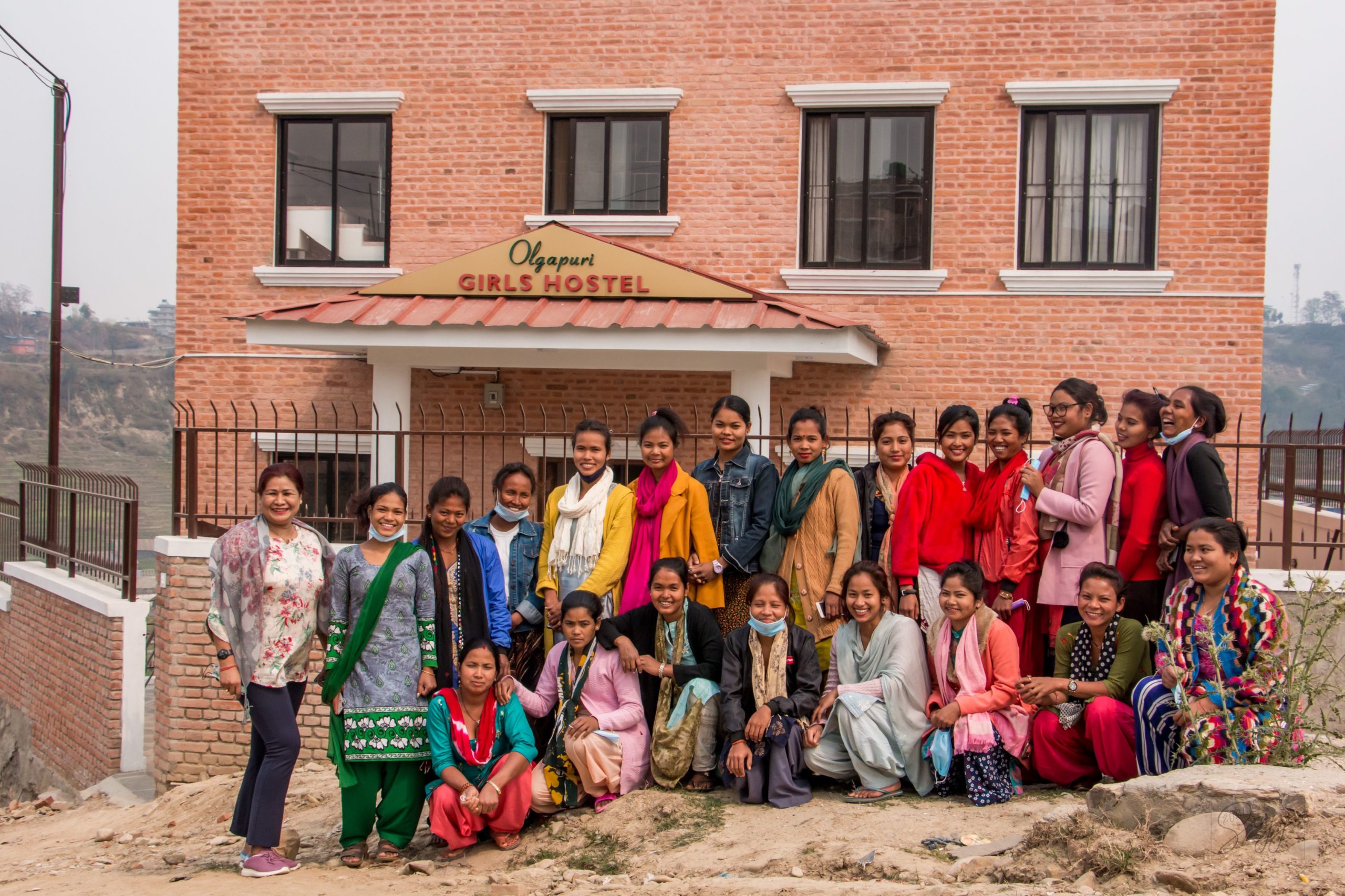
A second program was recently completed in a very remote, isolated village in northwest Kathmandu Valley. The program was well underway when this second surge began, and because the trainer was already in the village with all of the necessary equipment, and because the village is so remote that locking it down was simple, students and NYF staff agreed that this, too, was a safe option for continuing as usual. The new program graduates will be able to put their vocational skills to work once the economy reopens.
As the situation evolves in Nepal, programs like these will be decided on a case-by-case basis, with special care taken to protect staff members and students alike.
Scholarships & Kinship Care – NYF’s team has stayed in regular touch with scholarship recipients and families receiving Kinship Care stipends to ensure they are safe, well-fed, and continuing their education as best they can.
Schools around Kathmandu Valley are now able to provide online learning. The main disruption being experienced by our students is exam scheduling, which has been out of sync for over a year. Final exams across the country will be postponed until it is safe for groups to gather again. This may extend the length of some students’ studies.
Nutrition – NYF’s regular Nutrition staff – those who run the Nutritional Rehabilitation Home in Kathmandu – are currently working completely on COVID response, including Lito for Life and the COVID Isolation Center.
At NYF, we are so grateful for the hard work and dedication that allows these critical programs to continue. Thank you for helping us keep our promises to the children already in our care!
Emergency Programs
Lito for Life – Lito for Life is ongoing. (Click here to learn about this program.) Due to the current surge, no “super flour” is currently being produced, but our stock of already-prepared and packaged Lito is still being distributed, along with other staples like rice and potatoes. To ensure safety, our team members are not making deliveries door-to-door, but we are providing packages to orphanages, children’s hospitals, long-term care facilities, food banks, and other locations where individuals can access this critical resource.
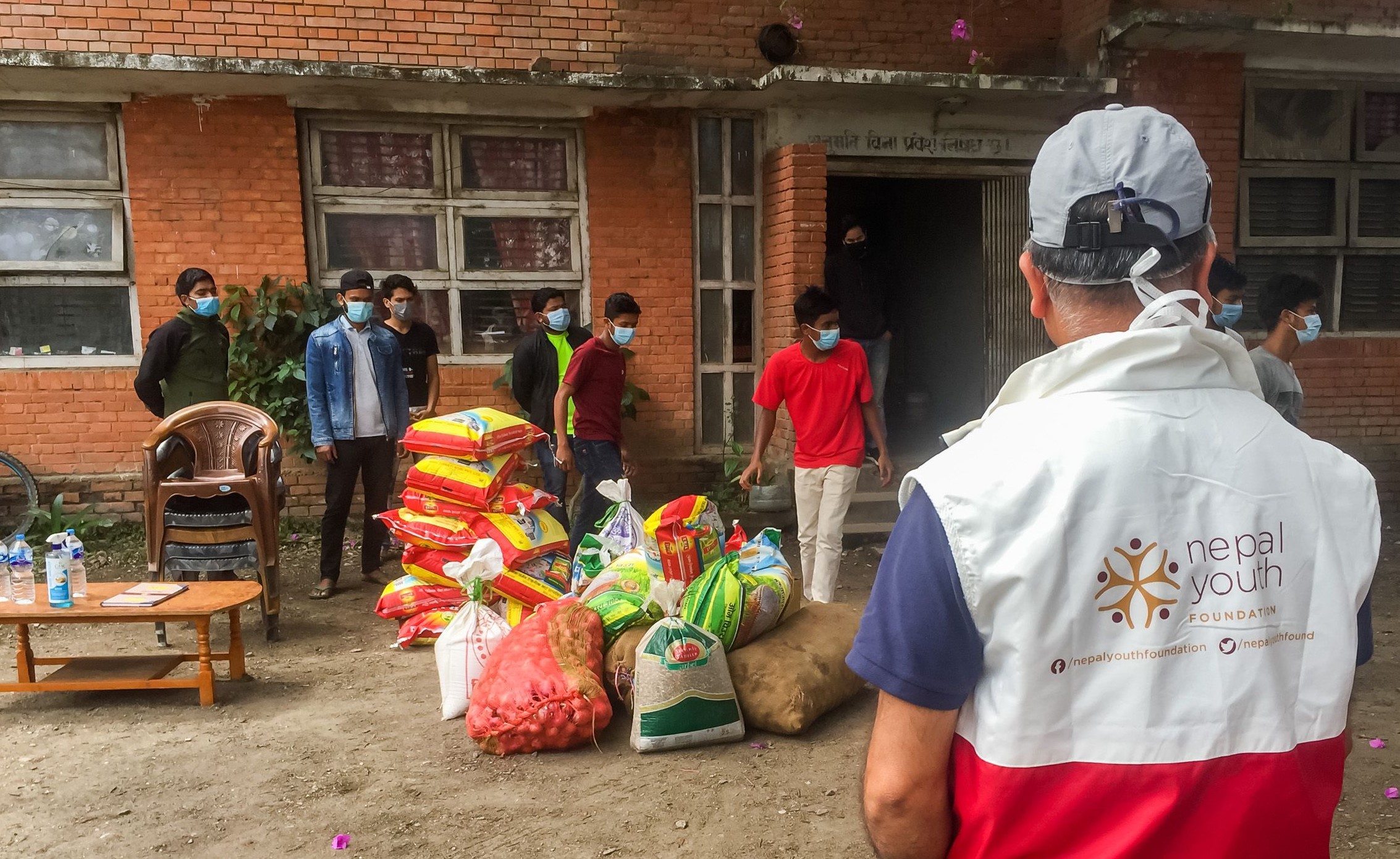
COVID Isolation Center – Our Kathmandu Valley Nutritional Rehabilitation Home and the adjacent New Life Center are being used as a COVID Isolation Center for individuals who have tested positive for the virus and are asymptomatic or experiencing mild to moderate symptoms. The resource is designed to allow individuals to isolate away from their families, to slow the spread. Our patients are coming mainly from orphanages, college dormitories and hostels, boarding schools, and housing shared by multiple generations and families within a tight space.
Most of our patients are children and youth, but we serve adults as well. Our youngest patient so far was an 8-year-old girl from a local orphanage, who was isolating with us to protect her 50 friends at home. Our oldest patient so far was a 73-year-old man. He has recovered and returned home to his family.
Many individuals who are isolating at home do not recognize when their symptoms have become too dangerous – and by the time they reach the hospital, it is too late to save them. At our COVID Isolation Center, patients are under the observation of trained medical professionals who know when an individual needs care in a hospital setting. The ambulance ride to the hospital is provided free of charge.
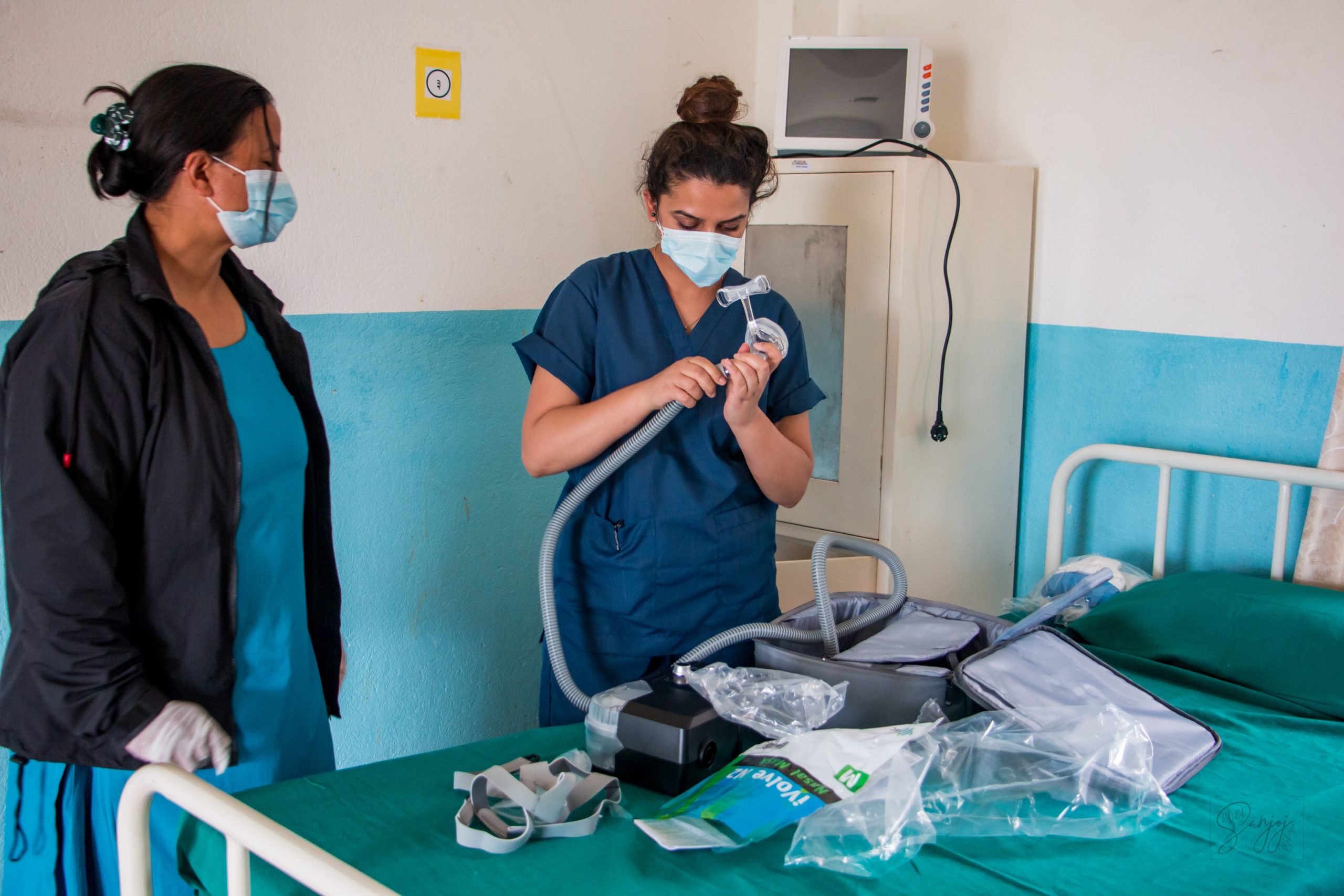
This week, our staff members received special training from a local doctor and his team to ensure that these patients stand the best chance possible as they wait for an available hospital bed to be located. Four beds at the COVID Isolation Center are being set aside for a “High-Dependency Unit” or HDU (above). Patients in need of hospital intervention will be moved to this area and held here, under stabilizing, high-level care and using special equipment, until NYF is certain a hospital ICU bed has been found for them.

We are looking forward to sharing more about this work soon!
What Comes Next?
The situation in Nepal is evolving quickly, and NYF is working to develop solutions as part of the broader Nepalese community. Som is working with government health officials in Kathmandu Valley on ways to support families who are isolating at home. We hope to share more about this soon!
Here is some good news: Som tells us that, thanks to awareness of the oxygen shortage in India, hospitals in Nepal have received a generous outpouring of oxygen resources from around the world. More vaccines are on the way. And aid is arriving from multiple governments, as well as from the UN.
Experts are warning that a third COVID wave may be coming for Nepal in October and November – just in time for the beloved family-centered festivals of Dashain and Tihar. With younger people being impacted by this second wave (most COVID deaths in Nepal are between ages 20 and 50), the concern is that children may be next. NYF’s global team is preparing for this, continuing to develop plans and expertise to meet this moment (and the next) with strength and agility. We are so proud of our team members who are continuing to learn new skills as this crisis continues to unfold.
And we are also proud of our team members in Nepal – house parents, nurses, tutors, instructors, cooks, drivers, counselors, administrators, and more – who are working so hard to continue keeping our promises to the children in our care.
Donations
We at NYF are so grateful for every single thoughtful gift we receive, whether for a specific program, a sponsored student, a piece of equipment, or “our greatest need.” Dhanyabad to everyone who has given! Your generosity is a true inspiration.
In times like these, even if COVID has provided the inspiration for your gift, the most effective way to give is to provide unrestricted funding. Unrestricted funding allows us to aim each dollar with the maximum flexibility, allowing the needs on the ground to drive our responses as the situation evolves. Unrestricted funding also allows us to continue keeping our promises to the children in our care by ensuring that each of our programs is fully funded and can continue as best as possible throughout the pandemic – and beyond.
To make your generous gift, please click here. Thank you so much for ensuring your #LoveWorks for the children of Nepal!
Purposeful Living & Olga Murray: A Celebration and an Invitation
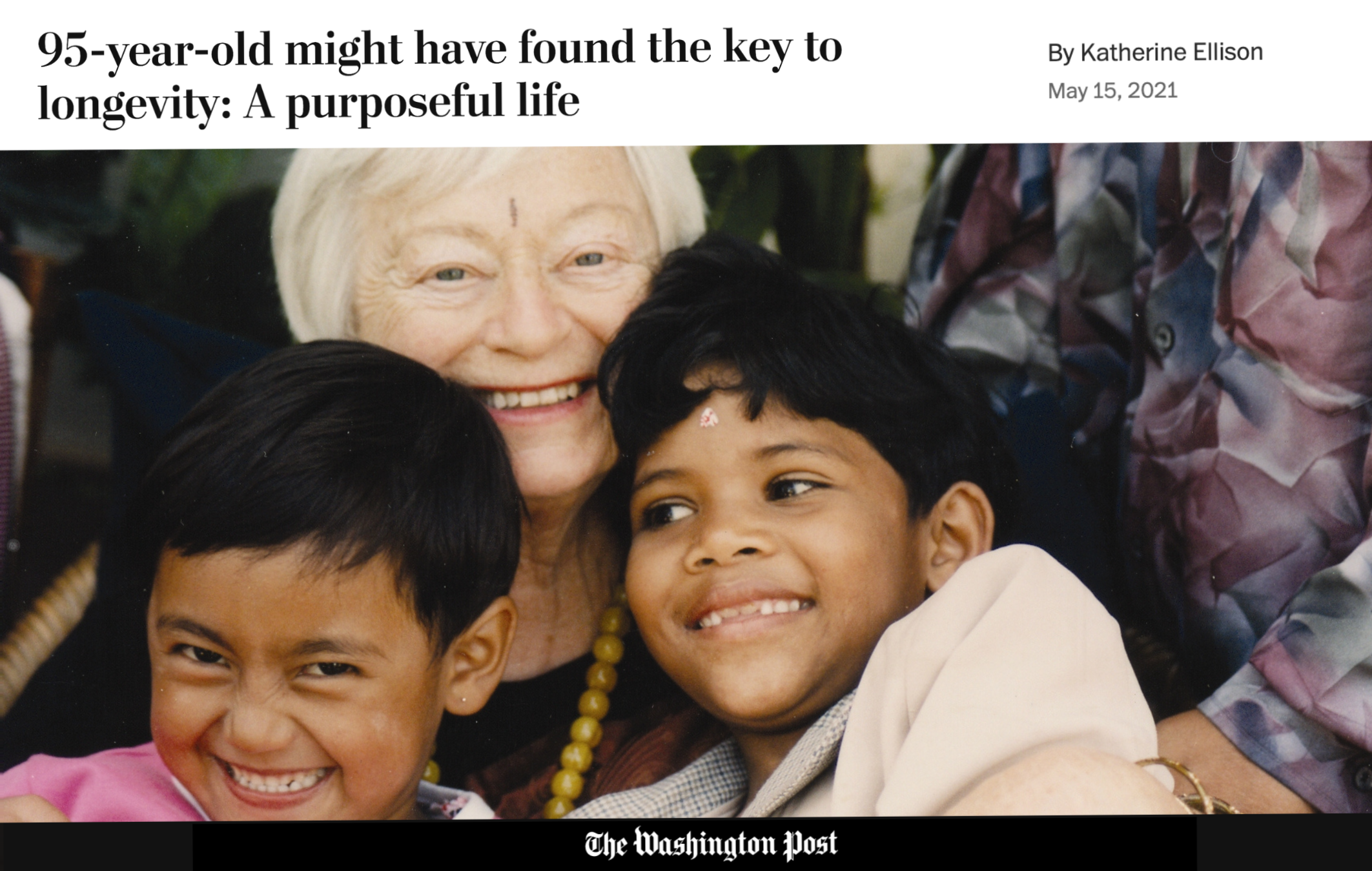
Purposeful living is the focus of a new Washington Post article about our very own founder, Olga Murray (click the link to open the article in a new tab – it is a beautiful tribute by Pulitzer-Prize winner Katherine Ellison!). Our beloved Olga, on the cusp of her 96th birthday, has been an inspiration during the past year of lockdowns and uncertainty.
‘ “I’m not a doctor,” ‘ the article quotes Olga during a recent interview, ‘ “but I do know that when I get out of bed every morning and think that I might help a little kid in Nepal, I’m not focused on my body… My main focus is on the kids.”
In her interview, Olga is characteristically modest. So much of Olga’s work is driven by her belief in others. She believes in those she partners with at NYF, like President Som Paneru. She believes in her friends, her connections – all those generous donors who make her work possible. Most of all, she believes in the children of Nepal, and in the incredible things they can accomplish if given the proper opportunities. (Bishnu Chaudhary, the young woman freed from domestic slavery who recently passed the Nepalese bar exam, is just one example!)
Even with purposeful living fueling her longevity, “I’m not going to be around forever,” Olga says pragmatically. “And the thing I want most in the world is for this program to go on.”
The NYF community is determined to make that wish come true.
If you’d like to learn more (and to see Olga Murray live over Zoom!), click here to register for our upcoming virtual Founder’s Day celebration! Join NYF’s email list here.
To support NYF’s mission during this challenging time – bringing Education, Health, Shelter, and Freedom to Nepali children – please donate here. For more powerful impact, consider making yours a monthly donation!
Maghe Sankranti, NYF and Freed Kamlaris Celebrate 20-Year Journey
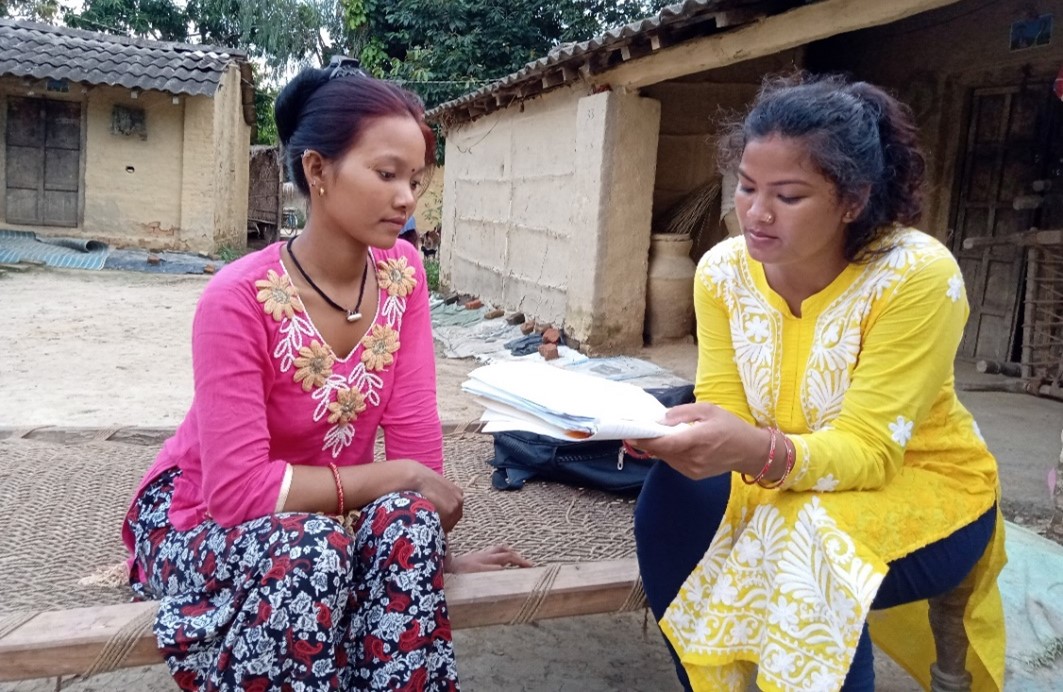
Maghe Sankranti 2021
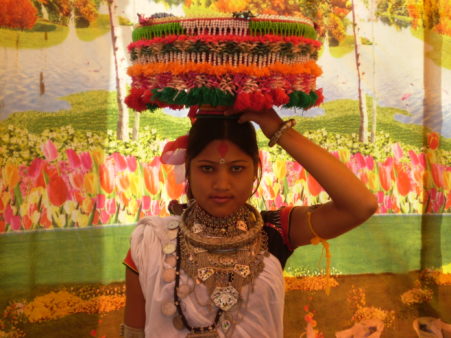
(Above, Jamuna Tharu, a Freed Kamlari and social motivator, prepares to celebrate Maghe Sankranti in 2009.)
Maghe Sankranti – The Tharu people in Nepal’s Terai region celebrate their New Year on Maghe Sankranti, which falls in mid-January. In 2021, that day was January 14th. Happy New Year!
For generations, this auspicious day had a grim meaning for young Tharu girls. Maghe Sankranti was the day the year’s debts came due. On this day, many families settled their debts in the only way available to them: by bonding their young daughters for a year of indentured servitude in the homes of strangers in Nepal’s urban areas. For these girls, some as young as five or six years old, “Happy New Year” meant goodbye to the safety of home—and a frightening journey to a life of kitchen slavery, dehumanization, and abuse. Bonded girls were known as kamlari.
But now, the girls freed from this practice are grown up and ensuring freedom and justice for their sisters. As the Freed Kamlari celebrate Maghe Sankranti this year, they are celebrating hard-won victories built over the past 20 years—including the certainty that the daughters of their minority ethnic group will never again be bonded away.
NYF began fighting the kamlari practice in 2000, with Som Paneru, Olga Murray, and Man Bahadur Chettri leading the way in developing long-term, targeted programming designed to free, heal, educate, and empower the individual girls and to challenge Nepal’s government to eradicate the practice once and for all.
Nepal’s government made the kamlari practice illegal in 2013.
In 2020, we published a three-part series celebrating the Empowering Freed Kamlari program’s transition to Tharu control, the rising leaders of the Kamlari Movement, and the ways the Freed Kamlari Development Forum is providing community support during COVID-19.
Today, NYF is proud to share another resource with the NYF Family: an in-depth study on the impact of our 20-year efforts to empower young women impacted by the kamlari practice.
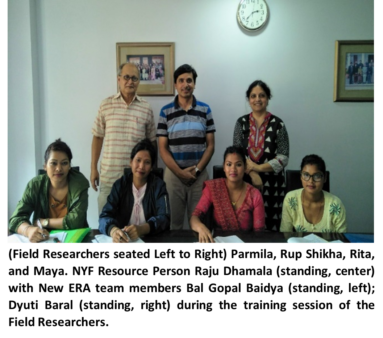
Click here to download the full independent study!
This study was conducted by an independent group of field researchers in 2019. They interviewed a sample of the women freed from the kamlari practice through NYF’s efforts, focusing their questions on topics linked to NYF’s mission: health, shelter, education, and freedom/empowerment.
During the 20-year Empowering Freed Kamlari program, NYF rescued 12,932 girls from domestic bondage. At NYF, we try to focus on individual stories as much as possible. But what about the other thousands of individuals served? If you’re interested in statistics about the broader impacts of our work, please read on!
We’re proud to report that the findings were incredibly positive! In almost all cases, the Freed Kamlaris and their families were not only doing better than they had before NYF intervened—they were doing better than national averages!
Here are just a few highlights:
Health
Other than offering mental health services through Ankur Counseling Center, the Empowering Freed Kamlaris program was not focused on health or health services. But researchers were surprised to discover the ripple effects of NYF’s focus on education.
Women impacted by the Empowering Freed Kamlaris program report much higher than average access to health education and resources for themselves and their families. For example…
Freed Kamlaris are having fewer children than their mothers did—an average of 1.5, which is lower than the national average. They report using family planning methods to ensure their families don’t grow larger than they can support.
Of the Freed Kamlaris with children, 88.7% delivered their last child in a healthcare facility, 97.2% had at least one prenatal checkup, and 82.4% had four or more prenatal checkups. A whopping 93.4% had had all of their children fully immunized as recommended for their age. All of them had had their children at least partially immunized.
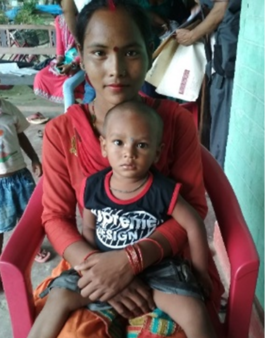
(Above, a 20-year-old married Freed Kamlari shows off her one-year-old son during her interview.)
Shelter
Extreme poverty was the main reason families reported for bonding their girls into the kamlari practice. NYF worked to ensure better economic resources for the girls we served, but home-building was not part of our programming.
Yet now, over 80% of Freed Kamlaris and their families live in homes constructed at least in part with “improved” materials. This includes at least one (and often a combination) of materials like galvanized sheet roofing (instead of thatch), cement or stone flooring (instead of earth), and brick or cement walls (instead of mud or bamboo).
Additionally, 90% of these families have access to sanitation facilities (plumbing) within their homes. Of the 9.5% using outhouses instead, many reported that this was intentional. Such facilities inside the home can be considered “polluting” for religious and cultural reasons, and many of the Freed Kamlaris rescued in early years reported that being forced to clean modern toilets was among their most demeaning experiences as kamlari.
When asked about their household’s main source of energy for lighting, 91.3% used electricity—a high proportion, indicating relative affluence. But 6.5% of the Freed Kamlaris surprised the researchers by reporting their use of solar panels! Off-the-grid energy sources were so unexpected, they had to be added to the list of options on field researcher questionnaires.
Improved housing is one of many ways these empowered women have leveraged their education and economic power to better their own lives.
Education
Education was a primary focus of NYF’s Empowering Freed Kamlari efforts from the very beginning. The earliest girls rescued returned home because NYF promised their families a piglet or goat in exchange for their daughters’ freedom to live at home and attend school.
The response was so strong that classrooms in the Terai region of Nepal were soon overwhelmed with too many students. Some in local government complained that NYF was causing problems for the school system! NYF responded by building 61 additional classrooms between 2004 and 2014 as well as ensuring schools had access to sufficient trained teachers, toilets, drinking water tanks, and furniture.
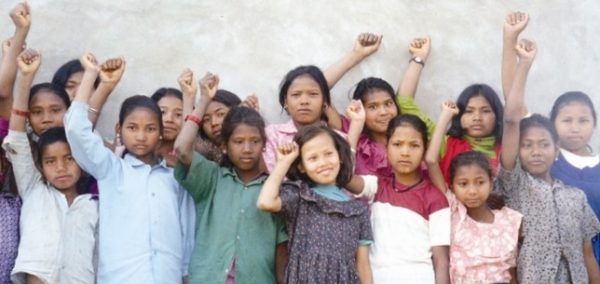
(Above, a group of newly-freed Tharu girls prepare to enter school in 2003.)
NYF also established and ran “catch up” classes to help young girls deprived of early education during their kamlari years. These courses ensured students could succeed alongside classmates close to their own age, instead of forcing teenagers to attend school with kindergarteners.
Now, Nepal’s national literacy rate stands at 67%. Among Freed Kamlaris, literacy is at 97%.
The average Nepalese adult today has completed 4.9 years of education. Among Freed Kamlaris, the average is 8 years—and rising, as 22.4% of Freed Kamlaris are still in school! About 30% of these women have completed grade 10 (the rough equivalent of finishing high school in the US).
Nearly two-thirds of the parents of Freed Kamlaris—61%!—had begun sending their sons to school once they saw their daughters going.
About one in three Freed Kamlaris have completed a vocational training course or received technical education in a field like engineering, computer technology, health care, dressmaking, poultry farming, or screen printing.
Around 4,000 Freed Kamlaris have received additional training through NYF in community leadership, cooperative management, organizational development, and entrepreneurship.
Just under 90% of Freed Kamlaris named educational opportunity as a way their rescue had improved their lives.
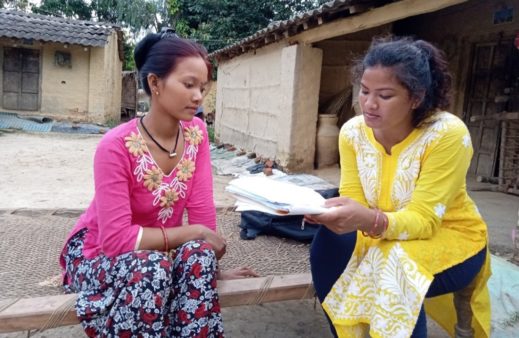
(Above, a Freed Kamlari, in pink, tells a field researcher about life since her rescue. All of the field researchers were women fluent in the Tharu language.)
Freedom
In many cases, freedom comes from education and economic empowerment.
Family members of the Freed Kamlaris reported that 92.3% of these women are currently contributing to household expenses (and remember, this includes the 22.4% who are attending school!). A similar number—91.1%—said that their family’s economic condition had improved in the last 10 years.
These families say the economic improvement came from their newfound ability to buy their own farmland or rent a larger area of sharecropped land, from the ability to start small businesses, or because of the employment of a family member.
About 29% of Freed Kamlaris are either employed or own a nontraditional business, including nontraditional crops like henna and mushrooms. This may seem like a low number, but the Tharu people are primarily a culture of farmers—so 29% is an enormous uptick!
Those Freed Kamlaris who have chosen to continue following the agricultural path are reporting huge advances as well. A full 75.1% of their families grow enough food to make their families entirely or almost entirely self-sufficient year-round through farming alone—an enormous blessing in tough economic times like the world is experiencing now.
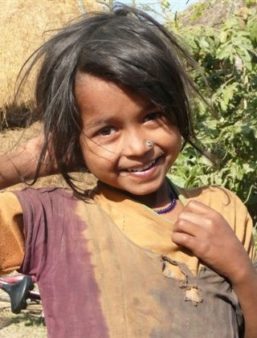
(Above, a young Tharu girl grins at the camera. Taken during the early years of NYF’s involvement with the Tharu people, this photo captures a moment very soon after this child’s return from her time as a kamlari.)
But freedom is also an internal experience—confidence in oneself and the ability to make decisions.
Researchers asked Freed Kamlaris whether they were allowed to make decisions in important areas of their lives: what age to marry, who to marry, whether or not to attend school, subjects to study in school, what career or job to pursue, and how to spend one’s earnings.
The area of least empowerment was what age to marry—90% of Freed Kamlaris were empowered to choose when to marry. (A main focus for the Freed Kamlari Development Forum is combatting early marriage in the region.)
When asked about subjects to study in school, 100% of these remarkable women reported they were empowered to make their own choices.
Freed Kamlaris were also found to have a high level of self-confidence that surprised the Nepalese researchers. These women were much more confident in themselves and their futures than the average Nepalese adult! The researchers also noted that this high confidence went hand-in-hand with grounded, realistic thinking.
A full 84.5% of Freed Kamlaris believed that their lives would improve over the next 5 years—and none believed they would be worse off.
Over 2/3 believed they would be able to take better care of their families in 5 years, and 54.7% saw themselves becoming more self-confident during the same time.
Ten percent of Freed Kamlaris hold leadership positions in community groups, and 21.5% are involved in social activism focused on the kamlari movement, ending violence against women, and ending early child marriage.
At NYF, we have so much to celebrate this Maghe Sankranti!
Thank you to every NYF donor for each thoughtful gift you have invested into these women and girls over the past 20 years. Your love—offered in the form of piglets, scholarships, start-up funds, vocational training, word-of-mouth, and so much more—have built opportunities and strength for a generation of young women. Dhanyabad! We are so grateful for your belief in these girls.
Now, 20 years after Som and Olga learned of the kamlari practice in Western Nepal, the journey continues for these incredible women as they step forward with new independence. The program’s valuable work is being carried forward with strength by the Freed Kamlari Development Forum—a Terai-based nonprofit led by the Freed Kamlaris themselves.
At NYF, we’re excited to step forward as well, putting 20 years of expertise to good use helping empower women and girls through new and continuing programming! We’re using the lessons learned over 20 years to continue serving communities of children throughout Nepal, ensuring their access to Health, Freedom, Shelter, and Education.
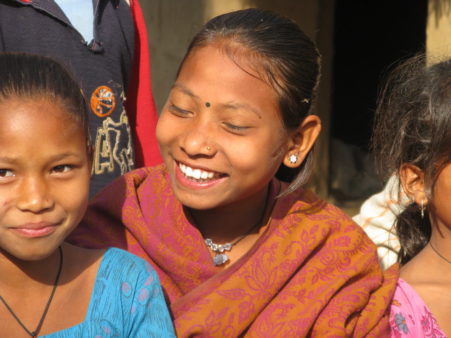
A freed girl grins in a bright moment during a 2009 celebration of the Freed Kamlari movement’s progress. Nepal would not make the practice illegal until 2013, but this girl knew the future was bright and change was on the horizon.